#its for an essay about a very niche subject
Text
Please reblog this too when you answer as I’d like to get this as far around as possible
#damn it hawkfurze#malevolent#malevolent podcast#arthur lester#aromantic#its for an essay about a very niche subject
160 notes
·
View notes
Text
sleep meme / hermes & patroclus.
tagged by: @nectaric thank u vvvvv much <33 !!
tagging: @askganondorftobadragmire @jfouler @thetowermuse (for octavo or burgh?) @nerofcrte @mightiestbanana @lcngdays (for angel or beldane?) @vonerde @drachliebe @tenebriism (for zagreus or yusuke?)

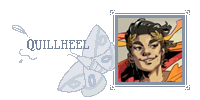
type of bed. hermes has adapted to a great many of different beds, and perhaps unlike some of his more luxury inclined brethren, he's really not picky beyond the surface being relatively clean & solid enough to support his weight. His chosen place of rest at his home, however, when he has the time to sleep there, is a klinē, a type of bed / couch often used for banquets ( symposia ). it's often considered a more luxurious piece of furniture, especially for the heroised, but he's never cared about little things like that. it's comfortable and easy on the legs, and that's all that really matters for him.
number of blankets. none, usually! the ichor in his veins, half brother to Apollo & son of Zeus, results in him almost always kept warm enough despite his light clothing. It does effect him, certainly, but it's never enough to bother with weighing himself down over. he prefers the speed & ease of getting up quickly without the blanket ( as well as disliking the pressure on his wings ) more than he dislikes the weather effecting him.
number of pillows. usually only one or two at home, though his usual default is using his messenger bag as one, or stealing a bundle of hay to act as a quick & easy one. his preferred pillow, if it can be helped, tends to be people instead. be it lover, friend, family, he sleeps best with them as a cushion ( plus, it's an easy method to be annoying if he so chooses <3 )
type of clothing. hermes often just wears his usual chiton, not even bothering to remove his boots usually, though sometimes he does sleep nude! he considers it more comfortable but usually can't be assed
does it matter where they sleep? not in the slightest! Hermes will sleep anywhere, in barns or branches, floor or rafters, bed or not, he's never been the type to hold himself to a high-and-strict standard when it comes to where he rests, no holy ground to hold his body when anywhere works fine, especially when its so fleeting when he ever needs to at all. he'd rather rest among his brethren than act as though above.
what do they do if they cannot fall asleep? oftentimes, just get back to work! there's always something to do across the world, Olympus and underworld, always something to carry, always something to say. though, it's very rare for Hermes to be unable to sleep unless something is really weighing him down, often regarding those close to him. if he doesn't feel like working, he'll often busy himself with company. it's very rare for anyone to turn down a God when they come to visit.
frequent dreams, nightmares. Hermes does not dream often. he jokes, maybe taunts, that the Oneiroi can't catch him. when he does dream, they're prophetic and intense, violent. they're not dreams at all, so much as they're an unconscious world pungent with the intention to tell him something, communication in the harshest senses, thick with burning and herbs and a thousand different prophecies, a million different secrets. how cruel it is, to be privy to such worlds as those, in the lines between the dead & the living. how often he is tasked with carrying ones of his own.
deep slumber or naps? Naps! Hermes does not sleep often whatsoever, so often he gets away with small naps, usually not even bothering to lie down. Though, when he DOES sleep properly ━ usually alongside someone else or in his own home ━ he sleeps deep, sometimes for 2 days or longer. only once every couple months, does it feel like the gaps of communication in the world go silent, like a network gone dead, an almost visible tension for the mortal world. a brief glimpse of the state without Hermes, no one to carry voices, no one to carry prayers. no one can do it like he can, and no one ever will.
when do they sleep? he sleeps whenever he pleases, mostly, when he does sleep that is.
what could wake them up? when napping, Hermes is VERY easy to wake up, but when he's sleeping more properly it depends heavily on who it is trying to. if a fellow God or divine entity attempts it, it's almost impossible bar stabbing him in the chest or otherwise doing major harm to him, but he answers, unhesitatingly, to prayers. he will not answer his godly kin, but he will answer, unfailingly, to his mortal brethren. you do not need to wake him; he will always come.

type of bed. Patroclus was accustomed to a great many makeshift beds in his lifetime, be it more lovingly constructed ones, ones he made himself ( often quickly, not bothering for a great deal of effort for a great deal of time he just couldn't spare ), or the ground itself. His most commonly used one would be a portable mattress made of cloth and stuffed with wool and Aegina bird's feathers, a gift from his grandmother: a nymph of that island, a labor of care of which he'd rely upon during the war. during his time within his own home & in Elysium, he'd likely have been offered to sleep upon Klinai, but very often would trade his bed to someone else, often the women of his home, for him to instead sleep on the floor. He still does, lying in the fields of Elysium, only restless greets him: for the dead cannot sleep, and he, always too weighted, to rest.
number of blankets. usually he used his himation as one, as was standard practice. when needed, he'd also use a sheep-skin blanket to fight off the cold, one he'd offer to his fellow soldiers often who didn't have their own.
number of pillows. none, usually. sometimes, especially if he was wounded, he'd accept or make makeshift ones for himself ( usually stuffed with grass or worn straw ) before giving them to others when he didn't need them anymore. This practice of going without continues in Elysium, despite the array of velvets offered always to him.
type of clothing. it varies. there'd been many times in Patroclus' life where he'd fall asleep in his armor, often midway through dismantling it from his person when exhaustion won over him, where Achilles would have to carefully, skillfully, strip it off of him before lying him to rest properly, good sleep eternally a valuable resource in limited supply. same going for him simply sleeping in his day-clothes, as long as they weren't dirty from the work. though the most often trend was only bothering to wrap himself in spare pinned cloth that'd last as a substitute for night-clothes until his usual clothes were clean and dry for the next morning. Patroclus never is dirtied in Elysium, and never sleeps, so he never changes. To do so would be taking energy from a pool that is always too shallow to drink from
does it matter where they sleep? yes and no. the quality of his sleep is effected, and he'll often struggle more to fall asleep when resting in places too quiet or too in anticipation of something ( his home & the tents often falling into either or both ), but he could still fall asleep there. he often felt most comfortable near rivers or the sea, the sound of moving water. he'd call it a gift from Achilles, to be so peaceful there, when he was borne from it. Thetis, never a guardian here, but never an enemy. it was all Patroclus could ask of her, in the way he did not ask at all, feeling unfit to.
what do they do if they cannot fall asleep? busies himself with other restless souls or with things to improve, tasks to do under the quiet of night, or doing them as Achilles sleeps nearby providing them to be quiet enough. He'd often find circles of other restless soldiers and sit with them, talking softly through the night, as he worked at his armor or something other. he often felt guilty, when Achilles would awake without him there and go searching, unable to find it in himself to wake him for such small pains as his lack of rest. in Elysium, he is always awake, and prefers to be alone, which is to say, he has never enjoyed being alone, but he chooses it regardless, as it was chosen for him.
frequent dreams, nightmares. his dreams always were a mix of signs given to him in empty messages. the effort to say something to him each time he dreamed, but full of empty shapes to fill the air alongside it, as though to cloud what vision was intended for him to see. his nightmares, often and unrelenting, he believed to be the distilled versions of these signs attempted to be communicated to him turned angry and forceful with their lack of acknowledgement, turning to a curse to bare instead. he'd apologize to Achilles as a vessel to the gods after waking, often not realizing he had at all. the apology for something not his fault.
deep slumber or naps? Patroclus has always been a relatively light sleeper, so napping has often been difficult for him on top of the desire he has to stay conscious incase he's needed, leading to him often only sleeping instead out of simple exhaustion
when do they sleep? when night falls, usually if he can help it, though sometimes he winds up sleeping at dawn.
what could wake them up? a small shake or a loud enough recital of his name is usually enough to do it, though he often wakes with a jolt, anticipating the worst even in his unconsciousness
#HI I DIDNT MEAN FOR THIS TO BE SO LONG BUT HERE U GO GBKTRH#iii did not mean to write an essay but when i get given a task god knows im going to deepdive into ancient greek bullshit and come back up#with an entire fucking Thing so. woe BHKGRB#i tried to be as fact-checking as possible regarding what ancient greeks would've genuinely done but if im wrong about anything please lmk!#i am not perfect and its sometimes difficult to find info about very niche subjects like what ancient greeks used for blankets BHKB#MUSE / Hermes#STUDY / Hermes#MUSE / Patroclus#STUDY / Patroclus#━ ♔ shielding your eyes from the bright noon-light : studies.#hades //#long post //#nectaric
5 notes
·
View notes
Note
Hi :) I read The Tragedy of Heterosexuality and loved it — do you have any other books you’d recommend about gender/sexuality? Thanks <3 I love reading your long posts, you have really insightful ideas and I think we view the world very similarly
Glad to hear that! Here's some context for anyone not in the loop: The Tragedy of Heterosexuality is a book about Heteropessimism, or rather, finding a way out of it. The notion is that heterosexual love is doomed because men and women are just different by nature, and it manifests through relationship self-help books, incels and pickup artists, and the memes and ramblings of countless straight women who they wish they could just be lesbians. Jane Ward think heterosexuality as we know it self sabotages through what she calls the misogyny paradox: straight men love women, except they don't love women. But she doesn't think heterosexuality is doomed or prop up political lesbianism as a solution. She calls for mutual respect and actually leaning into the heterosexuality of, well, actually liking each other, rather than try to "queer" it. This is part of a really interesting turn in queer theory where heterosexuality has emerged as a subject of study--another good example is Hanne Blank's Straight: The Surprisingly Short History of Heterosexuality.
So I want to start out by disclaiming I'm not actually that well read. This is something I've been trying to work on more recently. That said, here are some gender and sexuality recs:
Two essays by Gayle Rubin: The Traffic in Women and Thinking Sex. I don't completely cosign everything she says, but these are monumental texts. Thinking Sex is topical especially as the "sex wars" keep playing out.
Gender Trouble by Judith Butler. Everyone's heard of this, so my specific recommendation is to skip to part three and the conclusion, where the text is at its most concise. Butler's theory of gender performativity has exploded beyond their initial reach, so they've since had a lot of interviews and given talks that address a wider audience. People who have read both Gender Trouble and Bodies that Matter tend to recommend the latter text, but I still need to.
The Trouble with Normal by Michael Warner, or if you want a shorter version, his essay "Normaler and Normaler." Even if you're not against marriage in its entirety, his criticisms are so incisive and helpful, especially now in countries where gay marriage was passed but proved to be a dead end. It also really gets into gayness as identity versus behavior, which seems to have exploded into a huge conflict recently. This is how you get people who are on board with queerness in the abstract but appalled by its real-life specifics. I also still need to read Fear of a Queer Planet.
Sister Outsider by Audre Lorde, is a collection of speeches and essays by one of the most influential Black feminist writers. "Uses of the Erotic" especially stuck with me, where the erotic is taken not so literally but as a sort of creative synergy with political implications. If you've ever heard "the master's tools will not dismantle the masters house," that's included in this collection.
Close to the Knives by David Wojnarowicz, also a collection of speeches and essays, is one of my favorite books on AIDS. The rage is palpable and crucial, and the essay "Do Not Doubt the Dangerousness of the 12-inch Politician" is eerily resonant today as politicians still stoke violence on TV (and now social media).
Lately I've been getting more into trans writing, with Transgender History by Susan Stryker and Whipping Girl by Julia Serano. The former alarmed me with how much I didn't know, and the latter blew my mind. It was written at a time when trans people, for better and for worse, weren't really in the public eye except for in niche circles, and academia about trans people was about or at the expense of them but not by and for them. Her mark is so tangible today. My next read will be Reverse Cowgirl by McKenzie Wark after hearing rave reviews. I think I'm going to like it.
I am also accepting recs!
193 notes
·
View notes
Note
From the standpoint of someone who doesn't even like LO that much. Reading through this gave me a strange sense of discomfort? I think. Something about the combination of the essays, and the digs at the author in a lot of posts, and making a community based on it, and the ranting. It made it feel a lot more group ragging on something than normal fandom re-writes. I can't help but want to say something on the subject (0/3)
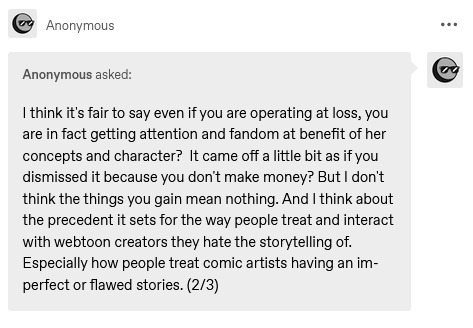
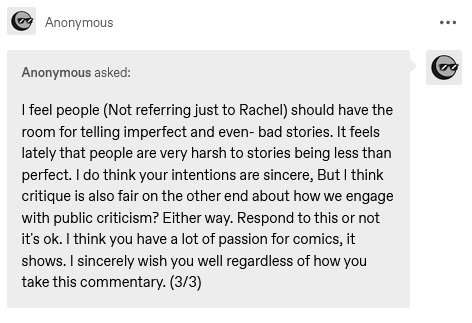
Gonna respond to all your asks together if that's okay, from what I can glean there's a word limit on mobile (?) so it makes it very interesting to see who's able to put all their thoughts into one big ask vs. who has to cut them up into parts 😆
So I can understand that discomfort, it's actually one that I also initially felt towards the community when I discovered it. Though even more so because when I found out about antiLO being a thing, I was still a MASSIVE fan of LO and my thought was "wow, these people are losers" LOL but then a lot of what they were saying resonated with me more as I realized the story was going nowhere (it was around the trial arc when Eris was revealed to be the 'reason' for Persephone's wrath).
All that said, I don't think I was wrong to feel off back then even though I don't feel that way now. We have our own takes and ways of approaching certain subjects, and how we feel is how we feel.
I will say that I can't, in any way, take credit for 'creating' the community. AntiLO pre-existed me by years and I was simply welcomed in as my opinions of the comic changed. I was a lot more involved in UnpopularLoreOlympus when it was born around the S2 finale of the comic. So... don't give me any sort of credit in 'owning' this community or anything of that sort, I came in during a period when criticism of the comic was becoming more common practice. I'm just also someone who's very verbose and loud in their opinions which appeals to a lot of people in this community, so I get why people might see me as some kind of "pillar" within it or like I'm the loudest person in the room, but I promise you that doesn't mean I have any sort of ownership over this part of the fandom or that I feel my opinions carry any more weight than the people around me. It's just a community, after all, not a religion.
It's true that saying I'm not making money off Rekindled doesn't mean I'm not benefiting off it in other ways. But the 'benefits' are still kinda... nothing? in the grand scheme of things? like okay great I have loads of people reading my stuff every update but like, this is still just Tumblr lmao none of this is real and as soon as Rekindled is over, I might be lucky to bring some of the readers over into my next project, but I doubt whatever I do next will get as popular as Rekindled was. All the "benefits" I get are virtually the same as what people writing fanfiction get on AO3 get or what people doing redraw videos on Youtube get. It's fake Internet points for making fan creations.
And that's okay, because that's sorta just the nature of fandom in general, throughout any niche community. People will be naturally drawn to what's familiar and what I do here appeals to the people who are familiar with LO and the criticisms of it, often people who agree with those criticisms. The Zelda community has LinkedUniverse, Pokemon has Hanamusa, Attack on Titan has communities that are dedicated to loving the anime, hating the anime, and even dunking on people who don't 'get' the anime, Undertale has every single crazy rewrite and rewrites-of-rewrites that have been spawned from its fanbase. Did you know there's an entire community of people who discuss and argue over fire alarms? I didn't, but when I found out about it, it was after listening to a video on Youtube discussing all the interconnected drama of the fire alarm community. Like that's wild and seems so stupid and pointless... but it matters to the people who are in it, and my opinion of how they operate isn't going to change how it makes them feel to be a part of that space. That's kinda just human nature, we create our own little microcosms of things to bond over so for people within those microcosms, any amount of disagreement or discomfort will feel massive in proportion.
I guess the point of what I'm trying to say is that a lot of this stuff feels crazy loud but it's really only that loud because it's occupying a single room.
The reality is that Rekindled is still a very niche project dedicated to a niche webtoon that's a part of a niche medium. As loud as it is within here, it's still only because it's such a closed community. Anyone outside of the Webtoons community has zero clue what it is. The 'attention' that I'm getting is still from other niche people who occupy a very specific interest.
And that's not even exclusive to Rekindled, despite Webtoons attempts to sell LO as a 'worldwide phenomenon', a lot of people don't know it exists and couldn't care less. Does that mean my rantings about the comic and its creator matter any less to me or the people who are interested in them? Not really. Is it all pointless? Maybe, but not everything really needs to have some bigger point. We're all kinda just here spending time talking about something we both love and can't stand. What I say about LO and do with Rekindled is undoubtedly inconsequential and pointless to people who aren't in the room. That's fine. That's why I keep it all in my own house. There are definitely people who talk about it outside of the home but that's far from what I can control.
That said, I think LO also does fall into a very unique category where it's very easy to do rewrites and redraws of it simply because it, in and of itself, is a rewrite. Rekindled is far from being the first "fix it" fic, not only of LO but also of any piece of media in general, it's not really a new phenomenon (but again, when it's loud, it can be easy to go "well clearly YOU had to influence this"). People are drawn to retelling LO or 'fixing' it because LO is based on Greek myth. If it weren't for that, no, I don't think people would be as interested in doing so. It's because we literally have a solid foundation of reference material - the myths and original poems - that we can go "hey, why did LO do this? it should have / could have been xyz". You can't really do that as much with a purely original work besides wish fulfillment of "what if xyz happened" because whatever an original piece of work winds up being is clearly what it was meant to be. We have nothing to compare it against.
But with LO, we know what it could have been because we know what it was trying to be since day 1 - a retelling of the Abduction of Persephone. That's not to say we always knew exactly what Rachel was planning on doing with it, but it's not hard to be disappointed when we see certain mythical stories being established in LO - such as the tale of Eros and Psyche, the Titanomachy, etc. - only to see them get dropped or completely mishandled.
On the one hand I could use HADES and Stray Gods as examples of popular media that don't get 'rewritten' the same way LO does because while they have their own unique interpretations of the myths they're based on, they still feel like properly thought out stories that appreciate the source material. LO, by comparison, feels like it's written by someone who hates Greek myth.
But on the other hand, those rewrites may absolutely exist and I'm just not aware of them because I don't occupy those rooms! The world is only as big as we perceive it to be.
That said, it's always sort of ironic to me when people say Rekindled is "riding off the coattails of LO" because while I can understand their sentiment - because obviously it's a direct re-creation of LO - that opinion seems to operating from the assumption that LO was ever not riding off Greek myth's coattails to begin with.
And no, I don't think my criticizing of LO on an LO-focused blog should in any way be conflated with "media isn't allowed to be bad". I've said this before and I'll say it again, I'm into loads of bad media. I'm also fully capable of enjoying a piece of media but also shit-talking it without actually feeling any sort of vitriol towards it. House M.D. is one of my favorite TV shows but goddamn some of the plots are just so dramatic and out-of-this-world that you can't help but laugh at them (and that's why we have spaces like /r/okaybuddyvicodin LOL). One of my favorite games growing up was Starfox Adventures because I had never played the original Starfox games but I had played loads of Zelda and Adventures was basically Zelda but with Starfox, and I know there are plenty of people who will go "but puff, that game is ass!" and I know! But I love it regardless.
With LO, it's not a matter of "bad media shouldn't exist!" it's a matter of observing what makes it so bad and why that's had a negative impact on both the audience it attracts (primarily teenagers and children) as well as the culture it's taking its ideas from. If LO was just some "so bad its good" webtoon that was easy to enjoy but also poke fun at, I would have zero issue. It's the fact that it's blatantly problematic in its writing and intentions but still hailed as the #1 webtoon on the platform (webtoons in and of themselves being a medium that I've lived in for over a decade so it's virtually impossible to get away from whatever is influencing the culture as a whole) while winning all these accolades for being "brilliantly written" and its creator is given a voice over Greek culture when she herself is not Greek or even well-read on Greek culture in any capacity - that's the issue and why I've spent so much time talking about LO. And if it wasn't me, it would be anyone else, because the problem has been around for ages and people have been trying to get the word out about it for years.
I don't necessarily think every 'fix it fic' is built equally. I think it's a case by case thing. A lot of people are deadass just doing it for fun and to be a part of a community, and I think that's wonderful. There are also people who try to do this but ultimately disrespect whatever the creator was going for by somehow implying that their own original ideas were inferior just by existing, or using their fix-it fics as a way to deliberately harass the original creators (ex. whatever the fuck 'art lore' is on TikTok, based on what I've seen it seems purely made for bullying budding artists and talking shit which is... gross af, but I don't think it's anywhere near the same as readers of LO calling out its highly successful award-winning creator for having zero clue what she's doing with her comic lmao). I don't think a blanket statement of "fix it fics are bad" accomplishes anything because it depends on a variety of factors like the person's intentions and what they're trying to accomplish. Many fanfictions in general could be called 'fix it fics' even if the creator 100% loved the source material with zero issue - because they're still saying "what if xyz happened instead"?
Me, personally? I'm someone who loves Greek myth and who used to adore LO. I was very discouraged and upset when I saw it turned into what it became, and I wanted to try my own hand at creating something new out of the rubble that could give me closure. It's what I choose to do with my time and other people seem to enjoy it as well. I'm sure there's loads to criticize and speculate on regarding my 'intentions' in creating it, but at the end of the day I'm sorta just doing what I want to do with my time because I have a lot of thoughts and ideas I need to get out of my head and many of them are thoughts and ideas that other people like reading about.
If you feel uncomfortable by the amount I talk about it here and the way I talk about it, that's fine. Those are your feelings. There are loads of other antiLO-themed blogs to read that might not give you that same vibe. Even I have certain icks towards certain opinions within the antiLO community, I've seen some people be genuinely shitty and I'm sure that's ironic to hear considering you're describing your own discomfort towards my stuff, but we all have different tolerances towards different things at the end of the day.
I do my part to keep things in my own house of a neighborhood that's really small in the grand scheme of things. It just feels like a big neighborhood if you don't travel. There will inevitably come a day where I'll pack my boxes and move elsewhere, talk about new things and write essays about other topics. That's obviously not today but I definitely don't want this to just be like, my entire identity or the rest of my life LOL it's just something I've chosen to spend my free time doing and I'm content with that. Maybe a year from now I'll feel differently, who knows? At the very least I'm hoping to one day finish Rekindled because no, I don't want this to actually be my identity for the rest of my life, change is a good thing LOL but what that change will bring is, for now, a mystery. Here's hoping wherever I end up at least brings its own uniquely good times like I've had here :' )
Sorry, that was a very long response with a lot of sorta aimless muddling over the topic at hand, but thank you for the opportunity to discuss it regardless ! because I do think it's important to find that 'grounding point' when it comes to stuff like this. because as much as I get riled up over LO, yeah, at the end of the day, it's just a dumb webtoon and I don't wanna go soiling myself over it LOL but I'm also just like... running a Tumblr blog with my personal thoughts and ideas, no more or no less. Even the "attention" I get is still only 200-400 notes per new episode of Rekindled, which pales in comparison to any real metrics of "success" imo LMAO again, it just feels loud because this is a niche community made up of a lot of the same names and faces; step outside of it and no one gives a shit LOL
61 notes
·
View notes
Text
It’s Always Sunny In Philadelphia: Realistic Representation
Hello Sunnyblr!
I asked if anyone wanted to see my paper I did on Always Sunny for school and some people said yes, so here it is. It’s like 5000 words and it was super rushed, so it’s not brilliant. Hope you have fun reading it and I recommend you also check out the sources I referenced at the end because some of those where a hell of a read and so fucking interesting.
[NOTE] This was originally intended for my teacher’s eyes who has not seen Always Sunny, so a lot of the first two chapters are very anecdotal and recount some plot points of always sunny, so if you know the show (which if you’re seeing this, you probably do) they aren’t necessary to read, neither is the log but I decided to include it anyway.
Introduction
This personal Interest Project will explore the way in which homosexuality is portrayed in the media, with an emphasis and focus on the TV show “It’s Always Sunny in Philadelphia” and the ways that they make the queer representation in it both realistic and relatable, to everyone in the audience.
I chose this as my topic for multiple reasons: I love looking at and reading about the ways that the media presents queerness and the LGBTQ+ community. I’ve consumed a large amount of media with queer characters since I was first introduced to the concept, and of all the media, the most relatable and well presented I have come across so far has to be in “It’s Always Sunny in Philadelphia” in the character of Mac and his struggles between religion and sexuality.
The way that homosexuality and queerness in general is shown in the media is important for society as a whole, as it is always important to see yourself and others reflected in the media you consume. In this study I reference self made questionnaires, interviews and researched secondary sources to further evidence my judgements in a way so that I could get diverse opinions on a niche subject. My cross-cultural component included interviewing people who have been invested in the show far longer than i have to show what has changed in the community’s attitude towards Always Sunny’s representation over the years.
Log
My first step in creating my study was to do secondary research on the topics of It’s Always Sunny in Philadelphia, LGBTQ+ representation in the media and the Queer habitation of fandom spaces.
Once I had a list of both formal and scholarly and informal references I could use, I sent them to my email to ensure they would not get lost or forgotten and I started reading them all, making mental notes on what to use as I went along.
Next I started by beginning an introduction to the study. I then made an essay plan for each chapter, making sure to note down which sources I would be using and where. I plotted exactly what I would talk about in each chapter and estimated how long they would each be.
When I started the body of my study I realised it was actually far longer than I had been anticipating and I spent a long time cutting it down before continuing with my Third chapter, which I realised I would have to condense down from chapters three and four into just one.
After I had finally finished the three chapters I made sure to annotate each of the sources I had used, add footnotes and graphs and relevant pictures.
The last task I had yet to complete was the log, which was easy to fill out even though i had made no attempts at creating a project diary (which I should do in the future so that this last process is even easier).
Chapter 1 – Sunny’s Dark Satire
It’s Always Sunny in Philadelphia is the longest running live-action American sit-com ever made. In 2003 two struggling actors, Rob McElhenny and Glenn Howerton came up with an idea that flipped traditional comedy on its head, made a pilot episode with a budget of $200 and titled it, “It’s Always Sunny on TV”.
The show was to take place in Hollywood, about three actors trying to make it big. The three main characters were Rob McElhenny, Glenn Howerton and Charlie Day playing as themselves.
The first episode, “Charlie has Cancer” started with Glenn visiting Charlie’s apartment to “borrow a bowl of sugar”, only to find out that his friend might have cancer. When Charlie starts confiding in Glenn about how he feels about all of it Glenn awkwardly responds, “Oh, I’m s--- did you wanna talk right now?”, creating the awkward, dark, satirical comedy aspect that It’s Always Sunny is well known for.
Later, after the show was picked up by FX, It was decided that the premise of the show would need to be changed. FX believed there were already too many sitcoms set in Los Angeles and they decided the new show would be set in McElhenney’s home town of Philadelphia, Pennsylvania. They also didn’t want it to be about actors as there were too many shows about that as well, but with the premise and comedy of the show the characters would need to have a lot of free time on their hands, and so the decision was made that the characters would be bar owners, and the name of the show was changed to “It’s Always Sunny in Philadelphia.”
The characters’ names also changed, McElhenney was now Ronald “Mac” McDonald (yes like the clown), Howerton was now called Dennis Reynolds and Day was still called Charlie, only the last name switched from “Day” to “Kelly” and Dennis’ twin sister was played by Kaitlyn Olsen. The show that started with the characters and actors at 28 and 29 years old, now has them at 46 and 47 in the newest season of the show which only came out in early June this year and the show is still signed for two more seasons.
Always Sunny was made to be an anti sitcom, a direct opposite to something like F.R.I.E.N.D.S. or How I Met Your Mother.
Most sitcoms feature lovable characters who might be a little morally dubious at the beginning but eventually turn into better people, sometimes they fall in love and get married and the end of the story is nice and happy.
Anti-sitcoms-- not so much.
While a sitcom explores the characters’ growth as individuals through comedy, anti sitcoms often do the opposite. In Always Sunny every single character is set up to be one of the worst people imaginable. The point of the show is to make you hate the characters and root against them so that when they finally get what they deserve-- often physical violence-- you feel justified in laughing at them.
Each of the characters has at least one thing that is absolutely awful about them so that if you get too close to liking them someone else can point out, How can you like him? He stalked a woman for 15 years! Making you like the character less.
They all have their terrible flaws; Charlie stalked a woman for 15 years, Mac is incredibly misogynistic and homophobic, Dennis has harassed and assaulted women on multiple occasions. The characters are awful, you can’t help but hate them, and that makes seeing them get what they deserve at the end of every episode so much more satisfying.
However, while we hate these characters, that doesn’t mean we can’t also relate to them. It also doesn’t mean that the show can’t have good representation. Because it does and we do; Topics like mental health issues, eating disorders, Childhood sexual assault and LGBTQ+ identities are explored by the characters.
But one of the things that so many fans of the show relate to about the characters is the queer aspect. In every show that has a fandom, there are characters consistently “headcannonned” as queer in some respect. Always Sunny is no exception, however, it did go farther in seeing how they had been portraying the characters, noticing that one of them did seem gay even to them and actually taking the step to confirm that the character was gay.
Chapter 2 – Mac’s Journey
In 2016’s season 11 finale McElhenney’s character, Mac, came out as gay. Mac was an ultra conservative man infected with so much toxic masculinity that he took any altercation and raised it to violence out of insecurity. He was also insanely homophobic, misogynistic and transphobic despite the fact that he once dated a transgender woman named Carmen on and off for two years.
Carmen was actually first introduced in season one episode four “Charlie has Cancer”, the pilot of Sunny on TV. Carmen was played by Brittany Daniel in the FX show, and the plot of the episode didn’t change much from the original: Mac tries to find a girl to get her to sleep with Charlie to cheer him up since he supposedly has cancer. The only girl he sees in the bar is Carmen, they start talking and Mac goes back to Dennis and Dee to tell them he’s “found the perfect girl for Charlie”. Then Dennis and Dee tell him that “that’s a dude”. When Mac goes to confront Carmen about it she expertly deflects the accusation and they continue flirting.
MAC: You lied to me.
CARMEN: No, I didn't. You lied to me. You don't work out? Please. I've seen you at the gym. You're ripped.
MAC: No. Don't turn this around. Wait. Really? You think so?
CARMEN: Yeah.
MAC: (flexes his muscles) I was afraid I was getting a little too ripped, you know?
CARMEN: Oh, no. I like it.
MAC: Wow! Hmm. Well, I gotta get back to work. Um, but I don't know. Maybe I'll give you a call sometime.
After that they end up going on dates and they seem like a happy couple apart from the fact that Mac is very clearly uncomfortable with dating someone with a penis. Eventually their relationship ends when while on a date, Carmen approaches Mac from behind and taps his shoulder and Mac freaks out and accidentally punches her out of instinct.
In a later episode of Season three, “Mac is a serial killer”, the plot twist of the episode is that, while the gang thinks that Mac has been acting shady recently because he’s now a serial killer, it is actually because Mac has been trying to hide the fact that he’s been dating Carmen again from them out of fear of their reactions considering what they thought the last time they dated. Through this episode Mac still clearly is uncomfortable with her being trans but he also seems to really like her considering the amount of research he had been doing into her “condition”, as Mac puts it. Towards the end of the episode Carmen dumps him because she thinks he is ashamed of her. Upset, Mac goes to Charlie and tells him “It’s over,” since he had assumed that Charlie knew the whole time. The gang confronts Mac about being a serial killer and Mac immediately yells back “I’m not a serial killer! [...] I’ve been banging the [t slur]!” Just as Mac had predicted, the gang immediately seems disgusted by this.
Carmen appears in two other later episodes as well, in one of them Mac runs into her at the gym and finds out she’s getting married soon. The rest of the episode is about Mac being so jealous that she’s getting married to someone that he decides that it is a “gay marriage” and therefore a sin and tries to dissuade the couple from getting married by using homophobic bible quotes. Predictably, this episode is called “Mac Fights Gay Marriage”.
The last episode with Carmen in it is one in which Dee gives birth after being pregnant all season, it is revealed at the end of this episode that after the Gang tried so hard to figure out who the father was all season and were prepared to look after this kid together, that Dee was actually a surrogate, and what’s more, she was a surrogate for Carmen and her Husband.
Miraculously, Carmen is the only character or side character who has ever left an encounter with the gang unscathed, she even somehow came out the end better, with a family. Every other character has been dragged down into the pits of hell with the rest of the gang whenever they’ve had to endure anything with them.
Along with being transphobic and yet dating a trans woman Mac was also very homophobic, and the best example of that comes from the season nine episode, “Mac Day”, in which Mac’s cousin from the country (“Country Mac”) comes to the city. Later in the episode Mac makes his friends participate in “Greasing up some Beefcakes” which is actually just rubbing oil on body builders. Mac says some very suggestive things when the Gang doesn’t want to do it-- “These guys work off their beautiful glutes for our enjoyment, okay? The least we can do is pay them back in tan and grease.”-- Country Mac seems all too up for the activity, however, and says he's been getting a lot of phone numbers. Dennis asks where there are women, to which Country Mac replies, “Chicks? No. Dudes. I’m into Dudes.” The Gang expresses their positive sentiments and when Country Mac walks away Charlie says, “It’s so much more comfortable when someone’s gay and open about it. And like, I know we’ve never said this as a group, but… Mac’s gay." The rest of the Gang all immediately agreed with no restraint. At the end of the episode, after Country Mac’s untimely death, Mac makes a eulogy which includes the characteristic homophobia, “And it turns out, he was totally queer. Which, as we all know, is a sin. And that, coupled with his radical religious beliefs, has most likely landed him in Hell, where he will burn for all eternity. So I will ask for a moment of silence, in which I will beg God's forgiveness for Country Mac's evil, homo ways…”
Although the writers clearly knew what they were doing with “Mac Day”, the season ten two part finale “The Gang Goes to Hell Parts 1 and 2” is where they really made their intentions surrounding Mac’s character and sexuality clear.
Goes to Hell were two of the episodes that showcased exactly how awful each of the characters are. In the story, every one of the characters committed one of the seven deadly sins and ended up on the brig of the Christian cruise ship they were on. They were on the Christian cruise ship because Mac had converted from his Roman Catholic church he had grown up in, to a Christian one because his usual church was “getting too Vietnamese”, just showcasing again how Mac is a horrible person.
Of course Charlie and Frank’s sin was gluttony in the form of alcoholism (they drank boat fuel), Dee was wrathful and punched a woman and Dennis attempted to have sex with a girl who was 19 even though he was 39. Out of everyone in the Gang, Mac was the only one who didn’t commit a sin and yet he ended up in the brig as well.
The reason Mac was in the brig was because he had found out the men he had become friends with were actually married and gay and Mac, being incredibly homophobic as he was, had decided that he was put on the cruise by God to convert them to being straight. This of course didn’t work and when Mac told the men all of this they said:
DAVID: You want to convert us?
MAC: Yeah!
DAVID: Do you realise how insulting that is? How would you like it if I tried to convert you?
MAC: Uh… Wouldn’t care. Cause that’s, like, impossible. There’s no way you guys could convert me to your lifestyle.
SCOTT: Let’s give it a shot.
The next scene opened with Mac walking straight into the brig, closing the door and saying defeatedly, “Well… I’m gay.”
Mac’s sexuality was further explored in the Season 13 finale, “Mac Finds His Pride” in which he came out to his father and his prison mates through an interpretive dance, only for him to walk out of the room midway through his performance. Mac was clearly devastated by this and the episode ended with Frank, who had accompanied Mac throughout the episode and who was typically quite ignorant and homophobic, finally understanding how Mac had felt his whole life.
Chapter 3 – Was it Good Representation?
Having representation in the media is important for all minorities. Minorities can see others like them, and non-minorities can see how minorities are affected by a world not catered for them and see how things need to change.
In a survey regarding what people thought about shows with Queer representation, I asked the questions: what was the best queer representation you’ve seen in the media and why?
In response to what the best queer representation was, the results varied greatly as there are many different pieces of media containing good LGBTQ+ representation. However, the most recurring answers were It’s Always Sunny in Philadelphia with 17.3%, Our Flag Means Death with 11.5% and The Owl House with 7.7%. The top qualities in good representation were (in order of highest to lowest); realism, normalisation, diversity, relatability, unashamedness, and acceptance.
In an interview with a long time fan of Always Sunny, 22 year old Lillian H, in response to being asked what she liked about the representation in Always Sunny, said that while she didn’t think that the portrayal of Mac’s identity was as good as it could have been her favourite thing about the show was it’s portrayal of mental illness and trauma: “There’s not many aspects of the show that I would ever look at as “good” representation, I mean that would be the opposite of the message that the show is trying to convey. I don’t even think that Mac is as good a representation that he could be. But I also think Sunny is the best tv representation I have ever seen of trauma and mental illness. One of my favorite things about this show is that at its core, Sunny is about five traumatized people who were deeply affected by their terrible upbringing and continue to perpetuate the cycle and project it all over anyone they encounter.”
Lillian started watching the show around the time the first two seasons had begun airing and was introduced to it by her Dad who loved the show. “My dad was obsessed with it and when we weren’t watching it on television he was showing me his favorite scenes on youtube.”, she said. She also talked about how when she was in middle school and properly able to digest and process the humour of the show beyond a group of adults yelling at each other for 20 minutes straight, she started engaging with the online fandom on tumblr. When asked how the fandom has changed over time she said, “The majority of tumblr users were under thirty, so I think the fans there were a lot more accepting and open minded than the people like my dad who just watched it on tv. I never witnessed any kind of blatant homophobia or racism of any kind. From what I remember everyone for the most part understood the satire and knew what the show was portraying was wrong. The blackface was definitely an issue though. It was (rightfully!) openly shunned and criticized in the fandom. There were other tumblr users that had never seen the show who would attack sunny blogs for being racist and problematic for supporting a show and cast that performed blackface. [...] The response to Mac coming out was initially terrible. He came out of the closet only to go right back in at the end of the episode. I think the majority of LGBTQ fans felt this episode made it clear that Mac's sexuality was being trivialized and played up for laughs. It was especially disappointing coming from a crew who claimed to be gay allies, one of which had two moms and a gay brother who worked on the show. When Mac finally came out for good, the response was overwhelmingly positive and celebratory. I think at the time even the older fans (like my dad) were too caught off guard to be hateful. It was a bizarrely emotional episode.”
In a separate survey when the question, “what was the best queer representation you have seen and why?” was posed, the reasons behind people responding with Mac from Always Sunny were mostly very similar; “because he is the epitome of who I used to be (Catholic and extremely in denial about my sexuality)”, “Mac McDonald, mostly because I can relate to him a lot. We are both gay, we are both religious [...]”, “It’s really relatable for me. I grew up in [a] catholic setting, so it was just easier to lock away my true feelings.”, “Mac's shame and guilt regarding his sexuality and being stuck in the closet and denial was executed well and it's something many lgbt folks can relate to”, “Mac finds his pride is definitely one of the best episodes of the show and shows his struggle with his internalised homophobia and struggle to find a place to fit in, which i can relate to.”
Most people in more recent times, when talking about why they liked Mac’s representation, reference how they feel it relates to them. Most of these people are gay, religious or both like Mac was and understand that what happened when Mac first came out and then went back into the closet was a way of denial and repression and something they related to.
This proposes the theory that perhaps this view in particular regarding Mac’s character and story has changed over time from something that people were unhappy about when it first happened to something that people now praise for making it feel realistic and relatable.
However this is a phenomenon known only to those within the fandom. In an interview with 17 year old Jordan Wade, who only considers himself a casual enjoyer of the show and has only watched the first two seasons, he said that he hadn’t really noticed any queer aspects to any of the characters and had not picked up on any representation in the show where he was up to. It should be noted that there is LGBTQ+ themes and representation in the first season in the form of Carmen and perhaps this shows that the only people who really pay enough attention to the show to be able to pick out and examine each piece of representation are those who are engaged in the fandom. And most people who engage in fandom are queer or part of other minorities and as such are already used to searching thoroughly for any representation.
In a survey, 10 memes from Always Sunny were presented to the participants and they were asked if they recognised the meme. On all of the memes 55 people responded and of all those memes the lowest number of people who recognised a meme was 32, with the highest being 51 of the 55 saying they recognised it. The spread of memes on the internet among people who know the show and don’t, contribute to the spread of the show, which contributes to the spread of its representation. Of the ten memes, before I had even watched the show, I had seen nine of them, just due to being online on platforms such as Tumblr and TikTok.
Conclusion
Ultimately, It’s Always Sunny In Philadelphia has some good representation of LGBTQ+ characters and also of mental health issues. The show is absolutely flawed but it is usually quite good at staying within the confines of a dark satire and using it to its advantage. Mac’s character could have been dealt with more gently and so could Carmen’s but ultimately they did really well with what they did at the time and many people relate really well to the characters. The characters and representation in Always Sunny is genuinely really good and many people agree that it is relatable, and realistic and not made a huge deal of, only increasing the value of the representation.
The use of realistic and relatable plot points in Mac’s story help to make the character more accessible to queer audiences. The fact that he came out and then went back in only helps queer people relate to him more. His internalised homophobia is ever present throughout the show and drawn upon to add to his queer identity, showing how overtime he worked on and diminished his internalised homophobia and was finally able to feel himself after the season thirteen finale.
While aspects of it may still be widely contested by fans of Always Sunny online, it stands without competition that Mac in many ways was good representation that fed people starved of representation. And while Rob McElhenney, Glenn Howerton, Charlie Day and the other writers of Always Sunny could have done better, it is undeniable that they were well intentioned and got their messages across quite well in the end.
Reference List
https://www.youtube.com/watch?v=HXY0uDeZ5jw
Charlie Has Cancer - Original Pilot. (2004). United States of America. Retrieved June 15, 2023, from https://www.youtube.com/watch?v=HXY0uDeZ5jw.
https://whatnerd.com/what-is-anti-sitcom-explained-with-examples/
McManus, B., McManus, C., Conall McManusConall McManus is a contributor at whatNerd. He’s an avid fan of cinema, Conall McManus is a contributor at whatNerd. He’s an avid fan of cinema, & Read more by Conall McManus ». (2022, October 12). What’s an anti-sitcom? Explained (with 5 great examples). whatNerd. https://whatnerd.com/what-is-anti-sitcom-explained-with-examples/
https://cyberleninka.ru/article/n/amusing-abusers-and-humourless-survivors-analysing-the-role-of-comedy-in-media-representations-of-sexual-violence
Rose, L. B. (2021). Amusing abusers and humourless survivors: analysing the role of comedy in media representations of sexual violence. Galactica Media: Journal of Media Studies, (3), 344-373.
https://mediarxiv.org/8hgfa/download?format=pdf
Johnson Jr, M. (2020). Queer Incrementalism and the Emancipatory Rhetoric of Redemption on FX’s “It’s Always Sunny in Philadelphia”.
https://www.youtube.com/watch?v=Qj12BBtbRkM
YouTube. (2022). The Gang Does Trans Representation. YouTube. Retrieved June 15, 2023, from https://www.youtube.com/watch?v=Qj12BBtbRkM.
https://deadline.com/2021/12/its-always-sunny-in-philadelphia-addresses-blackface-controversy-1234884709/
Haring, B. (2021, December 4). “it’s always sunny in Philadelphia” addresses blackface controversy in “lethal weapon 7” season 15 episode. Deadline. https://deadline.com/2021/12/its-always-sunny-in-philadelphia-addresses-blackface-controversy-1234884709/
https://www.teenvogue.com/story/lgbtq-fans-remaking-fandom-in-our-own-image-stitch-fan-service
Stitch. (2021, June 9). LGBTQ+ fans: We’re here, Queer, and remaking fandom in our own image. Teen Vogue. https://www.teenvogue.com/story/lgbtq-fans-remaking-fandom-in-our-own-image-stitch-fan-service
https://www.tumblr.com/sunnykeysmash/717820696920719360/im-also-thinking-that-it-would-mean-mac-would
Sunnykeysmash. (2023, May 20). “wait One Year” on Tumblr. Tumblr. https://www.tumblr.com/sunnykeysmash/717820696920719360/im-also-thinking-that-it-would-mean-mac-would
https://repository.library.georgetown.edu/handle/10822/1043761
Kimmel, K. (2017). THE GANG’S IN A THESIS: AN EXAMINATION OF AMERICAN TELEVISION’S DARK HORSE SITCOM “IT’S ALWAYS SUNNY IN PHILADELPHIA” (Doctoral dissertation, Georgetown University).
And of course thank you to @lgbdee for helping me and @sunnykeysmash for unknowlingly giving me something to use as a source and a good read lol. And thanks to everyone who participated in all the polls and surveys i put out, it was a huge help and I was able to get a MUCH larger amount of data on my surveys than my classmates did which I count as a win on it’s own even though I have no idea what my marks for this assignment were.
Also if you’re going to read any of the sources above I highly recommend “Amusing abusers and humourless survivors: analysing the role of comedy in media representations of sexual violence” by LB Rose. I genuinely really enjoyed reading it and reread it later too.
#always sunny#iasip#sunny sweet 16#its always sunny in philadelphia#it’s always sunny in philadelphia#iasip s16#dennis reynolds#macdennis#mac mcdonald#iasip mac#sunnyblr#charlie kelly#frank reynolds#dee reynolds#my essays#queer#lgbt representation#mentalheathawareness#personal interest project#society and culture
58 notes
·
View notes
Text
The internet sucks now. Once a playground fueled by experimentation and freedom and connection, it’s a flimsy husk of what it was, all merriment and serendipity leached from our screens by vile capitalist forces. Everything is too commercialized. We commodified the self, then we commodified robots to impersonate the self, and now they’re taking our damn jobs. We live in diminished and degrading times. I miss when memes were funny. I miss Vine. I miss Gawker. I miss old Twitter. Blogs—those were the days!
Stop me if these gripes sound familiar. In 2023, the idea that the internet isn’t fun anymore is conventional wisdom. This year, after Elon Musk renamed Twitter “X” and instituted a series of berserk changes that made it substantially less functional, complaints about the demise of the good internet popped up like mushrooms sprouting in dirt tossed over a fresh grave. Some people even complained on the very platforms they were mourning. Type “internet sucks now” into X’s search bar, you’ll see.
The New Yorker published an essay by writer Kyle Chayka on the subject, calling the decline of X a “bellwether for a new era of the Internet that simply feels less fun than it used to be.” People loved it. (Sample comments from X: “Relatable.” “Exactly right.”) Chayka claims that it’s now harder to find new memes, websites, and browser games than it was a decade ago. He also argues that the rising crop of platforms popular with young people—Twitch, TikTok—are inferior, enjoyment-wise, to the social web of the 2010s.
Both of these arguments are baffling. Memes fresher in the past? Yes, it’s tiresome to see Tim Robinson in a hot dog costume for the 500th time, but c’mon. In the early 2010s—the years Chayka longs for—the internet was all doge and doggos. It was the era of reaction GIF Tumblrs, the Harlem Shake, the Ice Bucket Challenge. Give me literally any still from I Think You Should Leave over “You Had One Job” epic fail image macros. Only glasses of the rosiest tint could recast the 2013 internet as a shitposting paradise lost.
The argument that the 2010s social web was superior amusement to the platforms now popular with Gen Z is even stranger. TikTok has major issues, but being unfun is not one of them. It’s been a springboard for some genuinely talented people, from comic Brian Jordan Alvarez to writer Rayne Fisher-Quann to chef Tabitha Brown. Binging Twitch streams certainly isn’t my thing, but people aren’t being held at gunpoint and forced to watch seven straight hours of Pokimane. They like it! They’re having fun! And how can one say with a straight face that gaming got worse? Roblox alone is a gleeful world unto itself; to pretend it doesn’t exist and isn’t a vibrant digital hangout is goofy and obtuse.
Corrosion of specific platforms on the internet—X, to pluck the most obvious example—is an observable phenomenon. (I, too, mourn old Twitter.) Musk’s changes to how X operates have made it harder to surface and verify information; his antics have driven away both advertisers and power users and allowed the cryptogrifter class to spam inboxes with invitations to NFT drops and meme coins, resulting in a digital space that feels abandoned and crowded at once. Other platforms, though, are flourishing.
Look at Discord, for instance. Its siloed structure is a throwback to the pre-Facebook internet era, when socializing online often meant logging on to specific forums. The disintegration of the Big Tech-dominated 2010s internet is creating a more balkanized social web experience, what Kickstarter cofounder Yancey Strickler calls the “dark forest” theory, where people turn away from big, open mega-platforms in favor of more private or niche digital spaces, from nonpublic Slack channels to invite-only WeChat groups or special-interest podcasts. While some people might find that boring and hard to navigate, it’s not universally boring, or inherently difficult to navigate.
There are serious problems with the internet right now. Platform decay—“enshittification”—is real, and it’s not limited to X. Search is in shambles. Plus, the flood of AI spam has just begun. But there were serious problems with the internet 10 years ago too. Arguing that the decline of certain corners of a previous version of the internet means that the entire internet isn’t entertaining anymore is a preposterous leap.
The impulse to describe the internet as being in a dire existential crisis is an understandable one, especially if you love going online—it’s easier to get people to pay attention to emergencies, isn’t it? All sorts of decidedly not-dead things get declared dead periodically, from literary criticism to monogamy to Berlin. “My favorite platforms are faltering and I don’t like the new ones” isn’t as compelling a pitch as “The basic experience of goofing off online is on the brink of extinction!!!”
But the basic experience of goofing off and being creative online is not on the brink of extinction. Ten years from now, there will be writers—even if they’re AI chumbots churning out shitty prose on SubstaXitch, the demonic merged iteration of Twitch, Substack, and X our poor children will use—earnestly reminiscing about the good old days of 2023, when that affable menswear guy showed up on everybody’s feeds, and TikTok wasn’t banned in the US. I know this. I know it because during the era that Chayka is now nostalgic for, people were also complaining that they missed the old, good internet. (Real headline from 2015: “The Modern Internet Sucks. Bring Back Geocities.”)
This brings me to my theory about the internet. To understand how people feel about being online, look at how they feel about the long-running sketch comedy television show Saturday Night Live.
Bitching about how SNL is so much worse than it used to be is a time-honored tradition. It has been declared “Saturday Night Dead” regularly since it debuted in 1975, nearly 50 years ago. In 1995, for instance, a New York magazine writer bemoaned the “slow, woozy fall of a treasured pop-culture institution.” The cast at the time included Chris Farley, Adam Sandler, Norm Macdonald, and Molly Shannon, all widely considered comedy legends in the present day. In 2017, in fact, New York ranked that cast’s run as the third-best era of SNL, ever, describing it like this: “At its peak, it’s hard to argue the show was ever better.” Quite the reassessment!
In 2014, writer Liz Shannon Miller examined the impulse people have to favor whatever era of Saturday Night Live they grew up with and watched during their formative years. “It’s a generational problem that leads to parents and kids just not being able to agree on the talents of John Belushi versus Will Ferrell,” Miller wrote for IndieWire.
A similar sort of generational problem is playing out right now about what it’s like to spend time online. Millennials grew up logging on in the 2000s and 2010s, maturing alongside Facebook. The internet from this era is the internet of our salad days. Of course watching it get eclipsed by a different iteration hurts. Of course some of us look at TikTok and wish it was Twitter—it’s the same impulse that propels family squabbles about whether the Lonely Island guys were funnier than the Please Don’t Destroy boys. Saturday Night Live has always been wildly uneven. Every era now heralded as golden was once pilloried as corny dreck.
To insist that the fun is over is to adopt an overly nostalgic stance, and one that rests on a pathetic fallacy: Just because you aren’t having fun on the internet doesn’t mean the internet itself is broken. It’s what it always has been, a flawed mirror of the cultural moment. It’s fine not to like it. But don’t pretend there aren’t young people alive right now who are having the most fun they’ll ever have online, just as there are young people alive right now who will be raving to their kids about how hilarious Bowen Yang was on SNL—especially compared to the synthetic clones of Gilda Radner and Jimmy Fallon the AI programmed to imitate Lorne Michaels cast in the 2061 season. We don’t need to make the present sound worse than it is. The future will come, soon enough.
14 notes
·
View notes
Text
im talking about the essay grade again and i got off topic and started talking about the lit analysis potential inthe vast majority of fanfictionbjust. Ignore
i feel like it's such a humblebrag for me to be like "i don't understand how i continually get really good grades in english" because i understand objectively that 1) i am very good at analysis and/or. finding quotes to support whatever the fuck thesis i decided would be easy to support (see: "good at analysis") (i think i honestly just randomly hit the jackpot on "good thesis" but on god i just looked at macbeth and gawain respectively and was like Ah. Women's Wrongs. Easy Peasy) and 2) i know from looking at other people's essays that i am just kind of. marginally-to-a-lot better at grammar and phrasing/understand the very specific madlibs-style layout i have to use and what vocabulary that i need to be putting out. it's madlibs. there's a really technical and specific layout that needs to be followed and i just kind of follow it. it's not hard. it is boring. if i could write academic papers on the shit i'm actually interested in they'd be worthless because it's niche and/or wild tumblr user conjecture. anyone who seriously writes on. hold on i need to generate a thesis. "the cyclic nature of abuse and its direct correlation to homoeroticism in cn's supernatural" could u fucking imagine. that's hilarious. that's some hackjob shit no matter how well i could keep a straight face on the matter because all that people care about is Old Shit. i have no real vested interest in actual literary works beyond "they're important and better than people think". i have extremely strong feelings on a lot of modern works, generally movies and shows and niche dnd webshows, i cannot make a career in that shit, my english prof thinks fanfic is bullshit and i see where he's coming from! i don't think it's bullshit. but. the academic perspective on fanfiction is like "they're not making original work" because the setting/adjacent themes and characters r lifted from another work and there's no real originality in it except that the best fics i've read are like.. an alternate form of literary analysis that is so far from actual essay writing that it's unrecognizable. but people can see the themes and the motifs and rehash them in a way that is absolutely a kind of analysis of the original work, but with flourishes and new ideas and batshit choices that the og media either couldn't make/didn't feel like making/tentacle sex wasn't really thematically fitting but an author decided "hey what if i put themes into this consentacles fic" and like, i want to argue that that's legit. sometimes. but i am not going to do that bc i sound objectively insane and also sometimes it is just not that deep and that will be brought up as an argument and i just don't care enough to explain that it's still an art form even if it's not that deep. is "fun and funky fresh" not a common motivator. if "new interpretations" of works like shakespeare and shit where they plunk the characters into a modern setting and fuck with the phrasing is seen as a viable art form/type of analysis then fanfic is an art form/analysis adjacent to that. not all of it though. some of it is something else that is worse. not that i think that is in itself bad. fanfic is a hobby. can't make a career out of that. but people have made careers out of that by changing the names and setting and publishing books. and that's viable apparently. i just personally am insane and enjoy writing very serious and/or emotionally driven meta on dnd shows. i like themes and motifs and i think that while a quickly written meta post on the tragedy inherent in redemption arcs that hit 50k is absolutely not as academically sound as a cited paper on a similar subject, there's Something To It and there's got to be some kind of potential in it. i like stories. idk if i could make a living out of talking about stories especially from the insane angle that i tend to hit stories at. the possibility of making it a genuine career is driven down below ground after i take into consideration my insanity about modern stories vs my neutrality on older ones. what am i talking abt. bf is yelling for me bye
7 notes
·
View notes
Note
I would also love to hear some of your headcanons for Alfred and Alexia. Only if you want, of course.
My headcanons are related to the fanfic I am currently writing, so none of them are directly related to the videogame and its canon.
Anyway, here are some of the headcanons I am working on (subject to change), from childhood to adulthood.
Alexia Ashford
Her family nickname is "Lexia". She hates her name being confused with Alexandra and its diminutives (Alexia is the feminine form of Alexis, not Alexander).
His greatest passion (and obsession) is literature. He reads absolutely everything as a form of escapism or hobby, as well as for study or knowledge. Outside of his studies and work, he reads a lot of contemporary philosophy and enjoys writing essays or non-fiction. Although he also reads a lot of fiction, he does not usually write prose, preferring poetry. Outside of literature, his interests include contemporary independent music (the more niche and quirky, the better) and cinema, which he watches with his brother, with the exception of a few films that catch his eye because of their subject matter or style. His favourite franchise is Alien because of the xenomorphs (because of their association with ants).
Apart from biology and chemistry, Alexia is interested in computer science, especially artificial intelligence, and music composition with electronic synthesizers. She is also knowledgeable in various disciplines such as physics, anthropology, history, etc. She is a Renaissance woman.
Alexia tends to be introverted and socially conformist so as not to attract attention. Unlike her brother, her personality, hobbies and tastes are straightforwardly unusual, rather than stereotypical, which tends to make her seem odd to those who do not know her.
The origin of their sociopathic tendencies is related to their social isolation, both forced and voluntary, due to their differences in intelligence and personality.
Alexia's genius is based on an accelerated learning capacity, and a highly developed problem-solving and creative ability.
Alfred Ashford
His family nickname is "Alf", like ALF the alien. The nickname was given to him by his maternal grandmother before the series premiered.
He started playing video games at the age of 7, as an escape and a way of overcoming the boredom of loneliness and the absence of his father and sister, who were at university. Alexander gave him the video game E.T. the Extra-Terrestrial for the Atari 2600 for his thirteenth birthday. As a teenager, his love of video games, especially the explicitly violent ones, would become one of his greatest passions and collections, along with music and film.
He is passionate about both high and pop culture. His favourite artist is David Bowie and his favourite film genres are slasher and snuff. His favourite serial killer is Michael Myers from the Halloween series.
His best and only real friend is his cousin Auguste Campbell, with whom he shares hobbies and sociopathic tendencies.
Alfred tends to be outgoing and socially normative, although his personality, hobbies and tastes are unconventional. He is not shy, but his lack of self-confidence makes him withdrawn and not as decisive as Alexia.
The origin of his sociopathic tendencies is related to the absent father syndrome with Alexander, his own insecurity at being compared to Alexia, and his contrast with Alexia's personality. He resents Alexander's incomprehensible indifference towards him, especially as he knows that Alexander had a very good relationship with his father Edward.
Alfred is gifted, although his talents come from the social sciences, the humanities and the arts. He has a talent for drawing.
8 notes
·
View notes
Text
Ayo! Time for a new intro post methinks (:
Sup bitches B)
I usually go by Jericho in online spaces
They/Them She/Her He/Him Pronouns and mmmmm boobs <3
(This is me deflecting the fact that my Queerness is extremely undefined. I know I am generally Ace, Genderqueer, and that my type would largely considered plus sized feminine bodies. Also dykes. I am a hot mess okay)
Its also impossible for transphobes to misgender me #diversitywin
(Speaking of Transphobes: IF YOU ARE A BIGOT REMEMBER THIS)

I am a History Major, Theater Minor fuckwit with interest in Ancient Civ and America's Founding.
I am most insufferable in my writing of 1000+ word essays on incredibly niche subjects like Why Ghouls Look Different Across the Fallout Games and Marius: An Analysis on Chivalry and Chastity and now Marketing Takes I am under qualified for like My Analysis of the Watcher Announcement
SOMETIMES I STREAM (mostly Fallout, Metro, The Sims, or whatever I'm feeling)
Topics I tend to talk about:
Dystopian Fiction
-Fallout (I am vocal of my disdain for the direction the franchise is going)
-Metro 2033
-The Hunger Games
-Occasionally "classics" like Animal Farm and 1984
Fantasy Fiction
-Baldur's Gate 3
-Anything Tolkien (but not the Amazon show. I very obviously have an ick for Amazon)
-DnD in general
-Legends of Avantris (A DnD group I am a major fan of)
(Fair warning, I am not a big fan of Critical Role or Dimension 20. I tried them out but I dislike the very corporate aesthetic. My favorite groups have always been best friends playing around their dining table.)
Fanfiction and Writing (#Jericho Writes)
-I read any of the media above really
-I write LoA, Fallout, Hunger Games, and Baldur's Gate Fanfiction.
Misc
-Acting and the Entertainment Industry (Film and Video Game specifically)
-Mental Health shit
(I've got PTSD and the Depression and Anxiety that comes with it.)
-Activism
(I try to keep up with most current events on here. It would be fair to accuse me of having a new cause every news cycle. But this account is largely performative information sharing, I follow up with causes that resonate with me privately. Topics I almost always post about are Disability, Reproductive, and Queer rights. I am not interested in Bad Faith debates about any subject I post about. This is your warning to leave if you expect to take issue with this.)
-Just general Queer shit
(If you are going to be Acephobic, Transphobic, or weird about people with non tradition identities you should very much leave.)
Godspeed, Good Luck, Gangnam Style
And all that ✨Jazz✨
4 notes
·
View notes
Text
Griping (with a few splashes of positivity) about my day yesterday:
Normally, my upper-division English class is great and teaching my 101 class is an ordeal, so it was kind of interesting that dealing with the juniors (mostly English majors) yesterday was incredibly arduous. Probably the only point that wasn't a slog was my brief detour into "stuff about The Madwoman in the Attic and why it's likely that you'll have to read it if you go into feminist literary studies at all, despite major issues with its takes on ... some earlier authors" (they tend to be more animated when I have strong negative opinions, lol).
Meanwhile, the 101 class was pretty cool yesterday. I was talking about synthesis vs analysis and about how engaging with sources isn't just about connecting sources to your core topic/ideas but to showing how the sources are connected, whether they're direct responses or part of a larger conversation.
The first is obviously easier with synthesis, and since I find direct response in academia often very funny, I very concisely explained the whole NINA policy drama I was talking about here the other day, and how Rebecca Fried vs whatshisface could be pretty directly linked in an essay on the subject.
But I did want to give an example to illustrate how sources might be in dialogue without directly referencing each other, so impulsively my example for that (since their current project revolves around writing to evaluate) was the characterization of reviews of the Netflix Persuasion in general by other reviews, with some references to particular uhhhh turns of phrase in some of the reviews, which they laughed out loud at (I am not usually a "makes my students laugh out loud" kind of teacher).
We got into how a paper on that might look at the ways in which (say) negative reviews overlap or where they focus on different or even contradictory takeaways, despite reaching the same conclusions. And I managed to squeak in a brief discussion of how you can use "signposts" to indicate interrelationships between different sources on roughly the same topics (signal phrases along the lines of "X argues that blah blah blah, based on blah blah. Y, on the other hand, contends...").
Normally that class is borderline comatose, but they were entertained enough to pay pretty close attention, and it'd have been a solidly good day in 101 if not for the very whiny student who wanted to talk after class about how the essay prompt's examples of acceptable sources were not applicable to her (extremely niche and unusual) chosen topic, and finally I had to just be ... yeah, so sometimes you have to find sources that are related rather than directly about your topic if it's one where sources are thin, which will sometimes be the case, so it's good practice. Anyway, the next class is arriving and I have to get my blood drawn, so come to my office hours or send an email if you have more questions, bye. (She did neither, in the event.)
A day in the life of teaching 101 for sure, but kind of aggravating after an unusually good day teaching it despite fasting for 13 hrs, after my upper division students had been complaining about having to answer questions about assigned reading (quelle horreur!) and having to use sources in literature papers.
Then I got my blood drawn successfully on the third time (today; they tried twice last week, so the fifth attempt overall). I picked up a prescription while I was there, made a glasses appointment for later that day (the receptionist looked at my multiple bandages from the blood experience and was like "...damn"), barely missed the bus that would have taken me across campus and had to walk instead (still without having eaten), and finally gobbled up some chicken tikka masala I'd had the foresight to bring.
Nobody came to office hours, so I logged in to GW2, accidentally ended up in the Mad King's Labyrinth, and tagged along with a genuinely hilarious squad commander whose lore kept expanding as we went on (he claimed all the labyrinth bosses were family members, that he was tragically widowed in the mysterious Skeleton War that claimed his husband's life, etc) and who ensured that the run was wildly lucrative for everyone.
The end coincided with the end of office hours, so I closed down and rushed back across campus to my vision appointment (which went fine, everyone was very nice, my eyes are in perfect condition apart from being a bit more near-sighted than before), chose my new glasses and absorbed the hit to my savings ($300 for glasses+eye exam wasn't that bad, but still), and then narrowly missed the bus AGAIN. I was going to just wait for the next because I was so tired and hungry at that point, but the sunlight hurt my (dilated) eyes enough that I trudged on along the route until another bus showed up and I managed to stagger back to my office.
It was another hour and a half before I got to my parents' house and my mother essentially tried to guilt me into sticking around with her siblings, even though I had stuff that I needed to upload for my students etc. We were eating Chinese food and my mother's sister (that aunt) started making racist jokes, so at that point I just went "uh, what" and ditched everyone to do my actual job.
Also, my advisor confirmed the date of my oral examination with the Graduate School. ;_;
But hey, my new gathering equipment rocks:
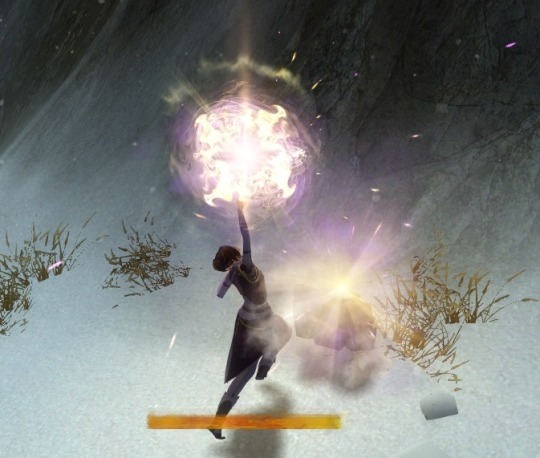
#anghraine whines#anghraine babbles#long post#on the bright side i got a truly incredible gw2 skin#i don't normally carry the pistol on the mesmer bc i like dual swords+greatsword better#but it's actually quite good and i do have an exotic level 80 pistol with the ascalonian ghost skin#soulbound to althea#but i might switch it at very long last for my equinox skin because WOW that's spectacular#worth 46 gold on the trading post and i desperately need gold after making my mother's legendary#but i can't do it ... it's too pretty >_<#ivory tower blogging#medical malfeasance#anghraine's gaming#ascalonian grudgeblog#anghraine's pics
6 notes
·
View notes
Text
How to Write an Article

In today's digital age, where content is king, mastering the art of article writing is essential for anyone looking to make an impact in the online world with the help of an article writer. Whether you're a blogger, journalist, marketer, or simply someone passionate about sharing your thoughts and ideas, knowing how to craft compelling and engaging articles can open doors to countless opportunities. This comprehensive guide aims to provide you with the tools and strategies necessary to write articles that captivate, inform, and inspire your readers.
Understanding Your Audience
Before you even start putting pen to paper, it's crucial to understand who your audience is. Defining your target demographic will help shape the tone, style, and content of your article. Are you writing for tech-savvy millennials, busy professionals, or stay-at-home parents? Conduct thorough research to uncover your audience's preferences, interests, and pain points. By understanding what resonates with your readers, you can tailor your article to meet their needs and expectations.
Bonus: 10 Free AI Essay Writer for Simplifying Your Content Creation
Choosing a Topic
The success of your article hinges on the topic you choose. Brainstorm ideas that are relevant, timely, and interesting to your target audience. Consider conducting keyword research to identify trending topics and popular search queries in your niche. Once you have a list of potential topics, narrow it down to one that aligns with your expertise and passion. Remember, originality is key. Choose a topic that hasn't been exhausted by countless other articles, or put your unique spin on a familiar subject.
Researching Your Topic
A well-researched article is a credible article. Take the time to gather information from reliable sources such as academic journals, reputable websites, and expert interviews. Dive deep into your topic, exploring different perspectives and uncovering valuable insights. Be sure to fact-check and cross-reference your information to ensure accuracy and integrity. Remember, the more thorough your research, the more authoritative your article will be.

Structuring Your Article
A well-structured article is easy to read and digest. Start with a captivating introduction that grabs the reader's attention and sets the stage for what's to come. Clearly state the purpose of your article and outline the main points you'll be covering. In the body of your article, organize your ideas logically using subheadings to break up the text and improve readability. Provide evidence, examples, and anecdotes to support your arguments and keep your readers engaged. Finally, wrap up your article with a concise conclusion that summarizes your key points and leaves a lasting impression on your audience.
Writing Engaging Content
Writing engaging content is both an art and a science. Use clear and concise language that is easy to understand, avoiding jargon and complex terms that may alienate your readers. Inject personality and voice into your writing to make it more relatable and memorable. Incorporate storytelling elements to create a narrative arc that draws readers in and keeps them hooked until the very end. Above all, be authentic and genuine in your writing, and your readers will respond in kind.
Polishing Your Draft
Once you've completed your first draft, it's time to polish and refine your writing. Start by editing for clarity and coherence, ensuring that your ideas flow smoothly from one paragraph to the next. Check for grammar and spelling errors, and make sure your writing adheres to the rules of punctuation and syntax. Pay attention to consistency in style and tone throughout your article, making sure that your voice remains consistent from beginning to end.
Adding Visual Elements
Incorporating visual elements into your article can enhance its appeal and effectiveness. Consider including relevant images, graphics, or videos that complement your written content and help illustrate your points. Create infographics or charts to present complex data in a more visually appealing format. Be mindful of the placement and size of your visual elements, ensuring that they enhance rather than detract from the overall reading experience.
Citing Sources and References
It's important to give credit where credit is due. Whenever you use information or ideas from external sources, be sure to cite them properly to avoid plagiarism. Follow citation style guidelines such as APA, MLA, or Chicago style, and include a list of references at the end of your article. This not only demonstrates your commitment to academic integrity but also allows readers to verify the accuracy of your claims and delve deeper into the topic if they so choose.
Reviewing and Revising
Writing is a process, and no article is ever perfect on the first try. Seek feedback from peers, mentors, or trusted colleagues to gain fresh perspectives on your writing. Incorporate constructive criticism and suggestions for improvement, revising your content as needed. Don't be afraid to cut or rearrange sections of your article if they don't contribute to the overall narrative or flow. Remember, the goal is to create the best possible version of your article, and that often requires multiple rounds of revision.
Finalizing and Publishing
Once you're satisfied with your final draft, it's time to prepare your article for publication. Format it according to the guidelines of the platform you'll be publishing on, whether it's your own blog, a guest post on another website, or a print publication. Add meta descriptions and tags to improve search engine visibility and make it easier for readers to find your article online. Finally, hit the publish button and share your article with the world.
Promoting Your Article
Writing the article is just the first step; promoting it is equally important. Leverage social media channels such as Facebook, Twitter, and LinkedIn to share your article with your network and reach a wider audience. Engage with your readers by responding to comments, answering questions, and soliciting feedback. Consider collaborating with influencers or online communities in your niche to amplify your reach and attract more readers to your article.
Monitoring Performance and Feedback
Once your article is live, keep a close eye on its performance and feedback. Track analytics data such as page views, engagement metrics, and conversion rates to gauge the success of your article. Pay attention to reader comments and reactions, and use them as valuable insights for future articles. Iterate and improve based on the feedback you receive, continuously striving to refine your writing and better serve your audience.

Conclusion
Mastering the art of article writing is a journey, not a destination. By following the strategies outlined in this guide, you can hone your craft and create articles that resonate with your audience and make a lasting impact. Remember to always put your readers first, and strive to deliver valuable, engaging content that informs, entertains, and inspires. With practice, persistence, and a commitment to continuous improvement, you can become the best article writer capable of captivating audiences and achieving your goals.
Unlock Your Potential: Become an Exceptional Article Writer Today!
0 notes
Text
UMass Conference Presentation: “Who Makes These Things Anyway”
I had an absolute blast at the “Theory & Practice of the Video Essay” conference last month at UMass Amherst. It was more like a film festival than a conference, and it was such a treat to get to meet and re-meet so many wonderful people in person and see such tremendous work.
Below is the talk I gave, which centered on three years of The Video Essay Podcast.
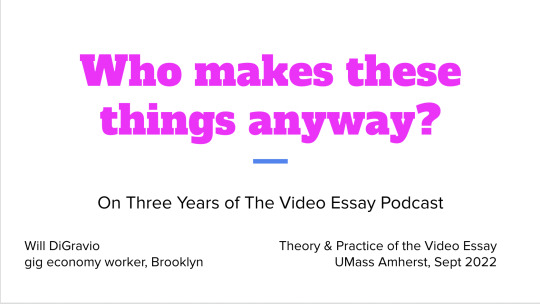
First, I just want to extend a big thank you to our hosts, Barbara, Daniel, Ian, Barry, Emily – everyone here at UMass who has made today possible. I think the subject of my paper today is going to be the ultimate example of preaching to the videographic choir, because I can only assume that a sizable percentage of the audience of this very niche podcast is sitting right in front of me. The purpose of my paper today is, in part, to reflect on three years of The Video Essay podcast. To go back through the archive of more than three dozen interviews and conversations, all of which have basically tried to answer a deceptively simple question:
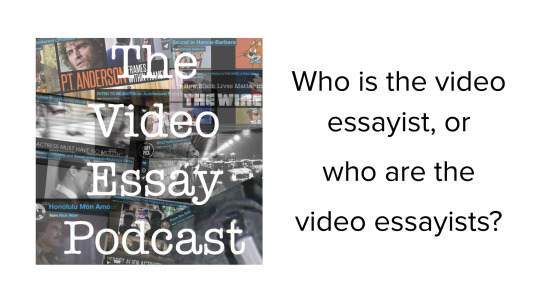
Who is the video essayist? Or, who are the video essayists?
I also want to say from the outset that the short paper I will be giving today is just one part of a broader, ongoing effort to reflect on three years of The Video Essay Podcast.
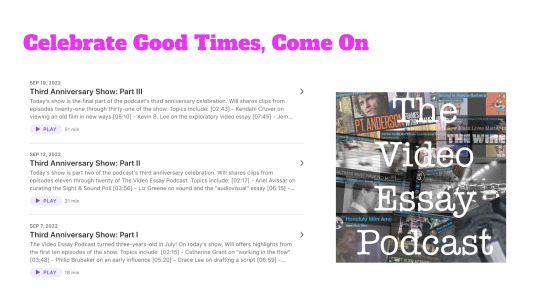
As part of my preparation for this talk, I curated and edited three episodes of the podcast, which together offer a celebration of – and reflection on – three years of the program. All together, they comprise about 100 minutes of clips from past interviews. I would encourage you to check them out. And, frankly, if not for this conference, I probably would not have rallied to edit together these episodes, so I very much consider them a part of what I’m sharing here today.
Now, of course, no paper, or video, or book on this subject could ever be totally complete and capture the diverse range of creators currently engaged in this kind of work. The interviews I have conducted since the summer of 2019 are just a handful of samples from a pool that only continues to grow. But I think the sample size here is enough to begin to look for patterns. And to, really, reflect on our growing community of practice, one that many in this room have spent years working to build.
But first, I want to talk briefly about the history of the podcast more generally and a couple of works in particular that have shaped how I approach my own work in this space.
As I mentioned, one of my primary interests on the podcast is understanding the influences of video essayists. On each show, I ask the guest to select a work made by someone else for us to talk about. On Episode 7, the filmmaker and scholar Jennifer Proctor selected Martin Arnold’s Pièce Touchée. I had never seen it before and I was absolutely blown away. I loved it, but I had no idea what I was watching.
That is what led me to the work that would shape how I thought about my own work going forward, Scott MacDonald’s interviews with independent filmmakers, the practitioners of what he refers to as a “critical cinema.”
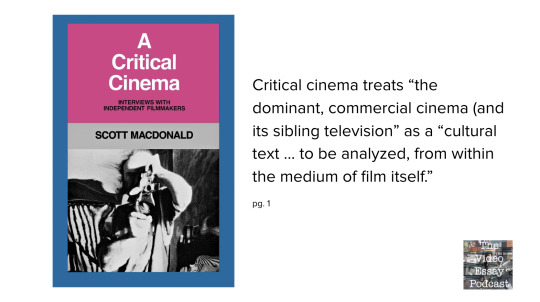
It goes without saying that videographic criticism carries with it a certain kinship with the avant-garde. But MacDonald’s discussion of critical cinema, one that treats, as he writes, “the dominant, commercial cinema (and its sibling television)” as a “cultural text … to be analyzed, from within the medium of film itself,” is particularly applicable to all of the things we are discussing and watching during this conference. I began to see the podcast in conversation with Scott’s work, and also as in-line with the rich tradition of the history of film studies and film criticism more generally. Given the relative youth of the moving image, the history of how people have engaged with it critically is quite extensive, and so I began to think of my podcast as continuing in that tradition.
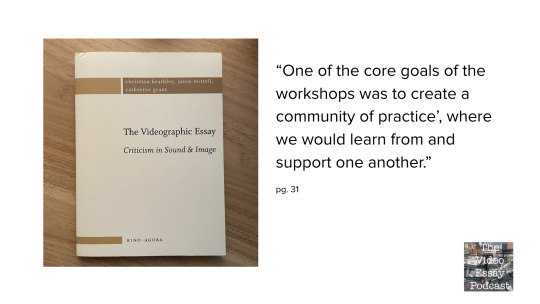
The other key influence is, of course, the work of Jason Mittell and Christian Keathley at Middlebury College, and in particular the Scholarship in Sound & Image Workshop and their collaboration with Catherine Grant. The idea for the podcast was born out of video camp, where, as many of you know, conversation about the form, the creative process, and the work of others is the fuel that makes the whole thing work.
Their book, The Videographic Essay: Criticism in Sound & Image, includes a roundtable discussion with former workshop participants. This line in particular stood out to me as I set about to create my podcast.
“One of the core goals of the workshops,” they write, “was to create a community of practice’, where we would learn from and support one another.”
This ethos – one centered on discussion, collaboration, and community – is really what still informs The Video Essay Podcast podcast. My goal has always been to capture and start similar conversations, many of which are centered on the creative process, and bring them to audiences outside of the workshop, and also creators outside of academia – to really tap into and help build up this existing community of folks interested in creating and watching this kind of work.

Now, in discussing the filmmakers he chose to interview for his multi-volume study, MacDonald writes in the first volume:
“From the beginning I have seen the process of interviewing as an educative one: I have wanted to talk with those filmmakers whose work I have felt I needed the most guidance with.”
This is precisely the vantage point I took in starting this podcast, and one that drives me to this day. What guides me in selecting guests with whom to speak, and there are many more I hope to chat with, including some in this very room, are the essayists who have some kind of process or way of working with material that becomes self-evident in the work, and that I want to learn about.
And thus my questions are often not focused on filmographies – going through each of a guest’s major works -- but instead tend towards questions of process and workflow. Of really, for lack of a better word, trying to get inside the mind of the video essayist. What do they watch? What sounds and images shaped their interest in this work? How do those early influences inform the materials with which they work now?
And this is why I see MacDonald’s description of the “educative” interview to be an apt term for what I am attempting in my work. On the one hand, I want to educate myself. I always joke that the reason I started this podcast is because I wanted to get free, one on one tutoring sessions with top videographic critics. I started the podcast while beginning a master’s program, and now am a young critic who hopes to have this work play a role in my career going forward, whatever that might look like.
This is also the audience I imagine for this podcast. Someone who is hoping to either start or further develop as a videographic critic. Someone who is looking for ways to improve their own way of working, who is looking to expose themselves to new ways of thinking and watching. And that really has been the goal of the podcast since the beginning.
As I briefly mentioned earlier, one of my favorite things on the show is asking guests about their early influences. Of course, many will often cite the work of folks like Kevin B. Lee, Every Frame a Painting, Catherine Grant, Matt Zoller Seitz. But often, guests will cite influences and formative experiences that I did not expect, or works that we might not usually associate with videographic criticism. Here is just a small sampling:
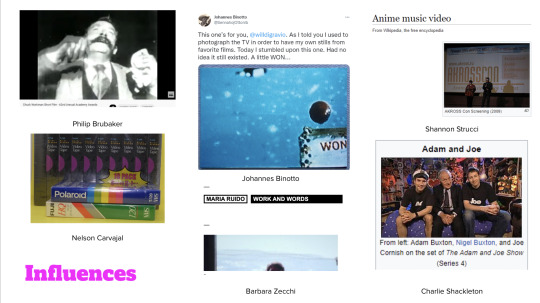
On the second episode of the show, Philip Brubaker talked about the lure of the Oscar montage videos as a child, specifically those made by Chuck Workman. Shannon Strucci cited anime music videos as an early influence and practice. Charlie Shackleton took inspiration from the British comedy TV program The Adam & Joe Show. Often on this program, for example, and I got this from Wikipedia, they would recreate famous movies with stuffed toys and cardboard sets. On the most recent episode of the podcast, Barbara Zecchi talked about the work of visual essayist Maria Ruido, whose work operates within an entirely different tradition, but has been influential in how Barbara thinks about her practice.
And then you have examples that we might associate with a more traditional understanding of cine- or telephilia. Nelson Carvajal talked about his obsession with blank VHS tapes, how he would record everything he could get his hands on, replaying the material back and forth until he eventually started making work of his own. Johannes Binotto actually photographed the television when he was young, all in an attempt to hold those images in his hand and have a tangible relationship with them.
To my surprise,
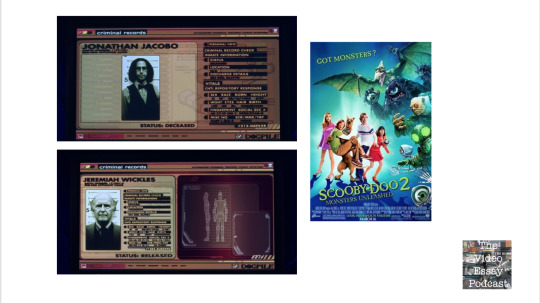
…these conversations triggered a memory of my own. When I was a child, I was obsessed with Scooby Doo 2: Monsters Unleashed. I haven’t watched it in years so in my mind it is still a great film. But I remember pausing my TV and trying to read the criminal profiles you see above. I remember wishing I could print them out and even thinking perhaps I could write to whoever made this movie and they would send them to me. Now, of course, I can hold and see and print those images relatively easily. They’re not as interesting as I thought though.
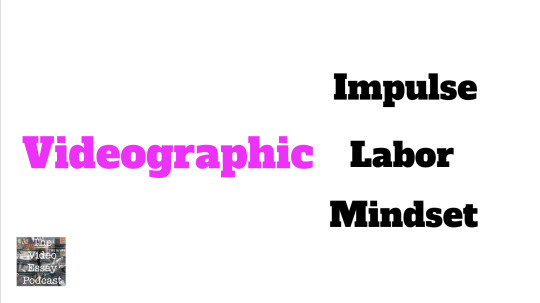
Without engaging in any scientific analysis, or psychoanalysis, I think each of these examples, and nearly all of the past interviews, reveal something about the impulse towards videographic criticism, and the mindset that many videographic critics often have about their work.
More generally, it is often some kind of limitation that brings them to this work. The limits of the written word, the limits of traditional scholarship, the costs and challenges of “traditional” commercial filmmaking, the inability to print images from the television set, I could go on.
I see this impulse as directly related to the labor of video essaying. Another goal of mine in starting the podcast was to try and show this labor, which all too often goes unseen. I wanted to document the work that goes into creating videos, and also track the video essayist’s relationship with technology as it develops.
Those who have this impulse towards videographic criticism, I am sure, greatly outnumber those who have been able to make this kind of work. Having passion or an idea is one thing, but actually being able to have the time, the tools, the resources, the energy to create is another thing entirely. In bringing this labor to the forefront, it was my hope to both recenter this in how we talk about this work, and also to hopefully share tools, tips, resources, and anything else that might lower that barrier to entry and make this work just a little bit more accessible.
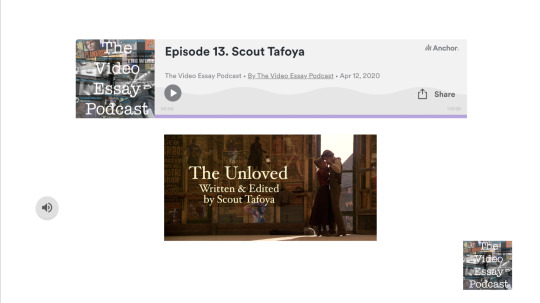
You can find many clips on the third anniversary shows that, I think, touch on these themes, but I just now want to play one in particular that I think everyone will appreciate. This is from part two of the third year anniversary show. It features Scout Tafoya, who many of you will know as a prolific video essayist, perhaps best known for his ongoing video essay series The Unloved, which is published at Roger Ebert dot com. Here, he talks about the process of starting a video and I think everyone here will appreciate it:
Is there any better summary of video essaying than that? But in all seriousness, I think of this clip as really the clearest distillation of what the podcast is about: sharing that which is not seen even in the greatest, most profound video essays.
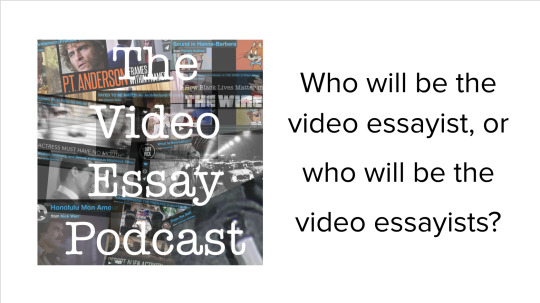
And so, as I look ahead at the video essay landscape and the future of the form, I am deeply excited by what will come next; what will be made by your students, or those of all ages who in the years ahead decide to make this form their own.
I saw yesterday, for example, that Jason tweeted about a student who had never before used a DVD or Blu Ray player. I still remember getting VHS tapes from Blockbuster, so I think I may be about the cut off point, a member of the last generation that remembers the days before the complete digital ubiquity of the moving image.
And so, I leave you with the following questions.
I wonder what new limitations will inspire video essay making. I wonder how the continued development of technology will impact those who are able to create video essays. I can only assume the laborious process Scout outlined will change and become easier. How will this impact what we are able to do videographically? And how will it impact the style and tone of the videos created? And, as videographic criticism only becomes more and more respected, when it becomes “traditional,” how will it continue to evolve? How will videographic critics think and feel about their work then?
These, I think, are all crucial questions. I have tried in my own work to document how the first generation of videographic critics, many of you in this room, think and feel about your work – and the creative process behind how you get the job done. I am excited to see what happens next and understand how the form will evolve in the years ahead. Such changes, I think, are already occurring. Here’s hoping The Video Essay Podcast, whether I’m still at the helm or the baton is passed to someone else, can keep documenting the answers to those questions.
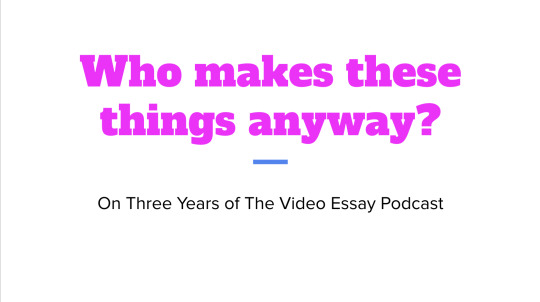
I am eager to hear what you all think. And thank you very much for your time.
0 notes
Text
The Fundamental Horror of DDLC: Script for Scrapped DDLC Video Essay
An indie game going viral online isn't anything new, it feels like every other week some small title with a somewhat interesting idea starts blowing up on social media platforms until people realize it’s a simple one trick pony and lose interest. But there is occasionally one of these breakout independent stars that turn out to be special, have a lasting impact on their player for years, think Undertale or the Five Nights at Freddy’s Franchise.
The subject of this essay, while somewhat more niche, is no different. Getting an expanded edition in 2021, four years after it’s original release in 2017.
Yes, I am talking about the visual novel Doki Doki Literature Club.
Before I can even begin to delve into what the game is, I should probably give a little more context as to what a visual novel is. Visual Novels are essentially what would happen if you crossed some of the elements of a video game (Artwork, Music, Sounds, Player Interactivity) with that of a Novel (You know..Writing).
It is essentially a novel that you read line by line, with visuals and a soundtrack to accompany it, usually having choices made by the player to determine where the story goes.
While that sounds all fine and dandy, the genre of video game has gotten a bad rap for years for its infamous subgenre, one that is the butt of every hardcore gamer or self respecting individual’s joke.
The Dating Simulator.
The whole concept being to use the format of a visual novel for a player to woo any cute girl they please, usually involving different tropes and cliches to appeal to some unrealistic romantic fantasy.
These also almost always have the japanese anime art style, which while nice to look at, usually makes whoever plays such a game look even more like a man who still lives in his mother’s basement.
So when Doki Doki Literature Club released on computer platforms for free with the anime art style and tag for the dating sim genre, most gamers rolled their eyes and moved along. But those who decided to look at the description noticed something peculiar.
“Not suitable for children or those who are easily disturbed.” Was written in big bold letters, the same warning greeting anyone who decided to install the game at the very start of it, making sure that they would see it.
It would seem like some kind of joke right? Everything in this game spelled out “Cute girls doing cute things and all being attracted to your player character”.
Well if said player continued on with the game, they would be on for a rollercoaster of an experience.
For the first few hours of the game, it truly lived up to its advertising. The Main Character had three romanceable options in an after school literature club. Sayori, the goofy and friendly childhood best friend, Natsuki, the cutesy tsundere (a cliche to describe one that is quite mean but only to hide their true and usually romantic feelings), and Yuri the shy bookworm. There is also the president of the club Monika who is really just there as a tutorial guide, not being romanceable.
The player will appeal to the girl of their choice by “writing a poem” after the club meeting is over by picking around 20 random words that would suit her personality.
But despite the romance flying through the air, there are some warning signs, sticking out if you pay close attention specifically in the poems.
Your childhood best friend Sayori's poems are almost all metaphors for depression. Natsuki’s poems show deep rooted insecurities and the possibility of an abusive father, Yuri’s poems implying an addiction to self harm.
So these girls have some problems deeper than the usual dating sim, surely the player can fix them?
Wrong.
At the end of Act 1 of the game the player will walk into Sayori’s room to find that she gave up to her depression and hung herself.
The game restarts the application, and if a player decided to look in the files for the game, they would notice the “characters” folder having Sayori’s file missing.
The Game’s menu shows everyone but Sayori, a distorted mess of code where she once was.
Your previous save file is gone so you have to start a new game for which then the game shows it’s true nature as a psychological horror game, a metatextual experience that twists every expectation of the dating sim genre, tearing apart the fabric of its own reality as it does so.
By the end of the game nothing and no one is left, not even the self aware AI of the antagonist Monika, who deletes the game to save her friends from the trap the game entangled them in. The only thing left was a letter from her to the player.
So yes, the story is messed up in every sense of it, but it is also brilliantly designed and written. Even though I only truly did a barebones summary of the first act and not much else the signs for what makes the story so incredible are there. Critiquing the genre it passed off as by twisting the player’s expectations, bringing up existential questions about the very nature of reality, existence, and identity, scaring the daylights out of the player throughout.
It makes any person wonder what they would have done in the antagonist shoes, how they would have felt in her position.
What if everything about me, my world, and simply everything I have ever known was a lie? What if the only fulfilling goal I could give myself, (romancing the player and thus interacting with true reality) couldn't be reached by me but my not real friends who only comprehend the flat two dimensional world around them?
Then to that extent, is it immoral to manipulate, or even delete the code of such friends if they don't really exist? What are the ramifications of toying with a fake reality as the only aware entity in it?
Those are the questions proposed by this game, and to that extent Monika. She might be the antagonist but she is not a bad person. Just a lonely young woman faced with existential concepts that no human has ever experienced.
The fundamental horror of Doki Doki Literature Club isn't only that it twists the expectations of the player, it’s also that it twists the expectations of the characters within it.
That made for a heck of an experience that no player will forget anytime soon.
0 notes
Text
Blame @petrichordiam for this.
-------------
Title: centerstage
Summary: An academic goes to a conference and is jazzed to see a jedi speak there. He unknowingly sits next to this jedi’s Support Squad.
The jedi Support Squad is like 85% clones, and 15% Jedi Generals.
No one mentions that the jedi speaking has never done this before and is petrified out of his blessed little mind.
*Anakin is like 19-20ish here.
-------------
Sion Jissard has spent the last ten years of his life in the dredges of archives, digging through documents and testing fibers found between the flimsy, papery pages of old texts—scrounging for clues to recreate the conditions of the great conference halls and small, tucked away offices in which some of the most powerful people in the galaxy once gathered to whisper and shout over the fate of whole planets.
He has a hypothesis that the conditions in those rooms affected the decisions made in them. His hypothesis is strong enough that it has endured several rounds of peer-review and escaped those vulture-like clutches mostly unscathed in published form—both in journal and, his chest swells to recall, in book formats.
His book has sold several hundred copies and been cited in a plethora of upcoming article submissions.
The last eight years of tension in his marriage has eased in light of this. The salary from the professorship obtained in light of the book certainly hasn’t hurt it either.
His two doctorates are set on the wall of his office and when he receives word that a conference on ‘Intergalactic Unionism and Peace Negotiation’ is to be held in two months time, he opens up the speakers list and raises his head to gaze upon those two solid frames.
There will be jedi speakers at the conference. Several, actually. The whole thing is to be held on Coruscant, in the small visitors’ wing of the Jedi temple itself.
Sion Jissard pinches the fabric of his suit and then lightly slaps at his cheek to make sure that he is not dreaming.
He has only recently begun studying the jedi order’s material world and the role that world plays in their intergalactic peace-making practices. Prior to this, he considered the subject too on-the-nose. Jedi studies are rampant. Everyone wants a piece of that pie—the allure of it being that the jedi themselves, scholars in their own rights, refuse to partake in examinations of their culture.
They are notoriously obstinate. Their grandmasters refuse to let outsiders into their archives. Their masters shut down any and all attempts to obtain interviews or transcripts or documents with empty expressions or gentle, pitying smiles. Their knights blink with confusion at personal and personal-adjacent questions, and the little ones, the apprentices, are shielded behind all of these people as though the elbow-padded questioners are threatening their precious little lives.
In short, the jedi are happy to listen but loathe to teach. If you are not one of their soldiers or one of their fellows, they will lie to your face and tell you that it is their religion to do so.
And yet here they are, offering up a scholar’s wetdream and even allowing a handful of their own to present on their areas of expertise.
Sion Jissard will pass up this opportunity only upon pain of death.
He applies for the conference as a participant, not a speaker, and is delighted to receive confirmation of his place within mere minutes.
He puts the date on his calendar and starts looking into transit to Coruscant for the event in two months time.
--
Sion arrives on Coruscant, at the foot of the Jedi Temple itself, and stares up at it for so long that he begins to feel sick to the gills.
He fumbles for his confirmation at the little table set up in the interior courtyard behind a side-entrance door. He is distracted by the fact that the woman he is standing in front of is a Jedi. She is helped by two small children and holds a baby who is dead-set on unraveling the knots that decorate her thick waist band. Even the baby is dressed in double-collared cream-colored robes.
Sion has so many questions he wants to ask.
The jedi asks him for his name. She has a collection of name badges before her, but none of them are his. He gives his name and the master turns to the little girl sat at her right elbow with a brush in hand and instructs her to write it out.
The jedi child—not an apprentice, her robes are cream still, there are no additional earth-colors layered on top of it—writes Sion’s name in beautiful script on a little card and hands the card to the master, who puts it in a holder with a pin on it and places it into Sion’s hand.
She instructs him to go through the side door and enjoy some refreshments before the event begins. The baby in her lap looks up at her abruptly and bonks his sweet little head against her chin.
Sion forgets himself.
“How old?” he asks automatically, gesturing to the baby.
The master looks down into her lap.
“He is eight months and 75% lung,” she says affectionately.
“Ah. Mine was like that, too,” Sion says. “He grew out of it. He’s only 40% lung now.”
The master smiles.
Sion removes himself from her table before he embarrasses himself further.
--
There are enough people inside the front room of the jedi’s visitor’s wing to nearly fill it to capacity. The volume, though everyone is whispering, is great enough to be heard from outside the door. The room itself is earth-colored with a high ceiling. Its walls all contain niches with rounded borders. Columns with deep-cut creases in them arch high to the skylights.
It is all beautifully geometric, stoic, and clean. And even though the walls and floor are built from materials of warm tones, the skylights overhead and the surrounding addtion of books and holorecords set into the walls lend it a cooling quality.
What should have been imposing architectural feels more like holy space. The room is one that reverberates with reminders to respect all around you.
Sion’s fingers yearn to document this, but there is a sign right by the room’s entrance that asks politely for no recordings or holographs to be taken.
“Professor Jissard,” a familiar voice says.
Sion feels his whole body droop. He turns to see Teo Detras stood before him in his obnoxious, roaring red robes.
“I’m pleased that you too were able to secure an invitation, sir,” Teo says as though he has not attempted to place Sion on the metaphysical chopping block for each of his premises since the time they began their academic programs.
Sion opens his mouth to point out that this is also his area of study and that Teo has no monopoly on the field of Jedi architecture when a quiet passes over the room. Sion watches the heads around him lift and searches for the source of the sudden shudder of silence.
He finds it in a tall master with dark skin standing at the very front of the space. The man has tucked his hands neatly into the mouths of his sleeves.
He is Jedi Master and General Mace Windu. Sion has read and reread his essays, not caring so much for what he is talking about but how he is talking about it. His metaphors and examples should have been insight into the common experiences of those living in the Jedi temple.
Sion has found, however, that Jedi Master Mace Windu does not especially care for eloquence or metaphor. He cares only to methodically destroy the argument (if it could be called that) published by a jedi named Qui-Gon Jinn many years ago. Though Master Jinn has not published for several decades now, Master Windu’s writings remain agitated by his interpretations of the jedi’s Spiritual energy, the Force.
Just gazing upon the man now, Sion would not think him capable of agitation.
Master Windu welcomes the academics to the temple and says that he regrets not having more time to speak with each of the attendees as individuals, but there is a war on and his clone troopers require his services. He encourages people to refrain from any recordings of the temple due to its sacred nature, and he asks that attendees be mindful of the jedi Initiates (the white-robed children) who are confused and intrigued by all of the non-jedi people inhabiting their usual playroom.
He cautions everyone that if anyone slips on a toy, he warned them, and the temple is not liable for their medical bills.
This is a joke.
People are unsure of whether or not to laugh. Some laugh awkwardly far too late. Master Windu gives no sign on his face that he appreciates or disapproves of this.
Instead, he steps from his space of honor and leaves in his place a young man with feathery blonde hair and a highly expressive countenance, who drops his armload of documents on the floor obnoxiously and flings himself down to snatch up only the conference program, as if this was the most efficient way of finding it.
People know to laugh this time.
The young man begins announcing panel topics and rooms and give his strong opinions on each of them.
More people laugh. It feels less like a sin.
“And that’s all, my dears and darlings,” the young man says, “Mind your step into the conference rooms, our predecessors derived joy from an unexpected drop.”
--
Sion has only one panel that he will kill at minimum three bodies to sit in on. It is the one on peace strategy and resource management. He is not here for the peace strategy or the resource management parts of the talk; his burning interest yearns instead in listening to how and if people talk about their space and things. He wants to write down the language they use. He wants to learn about the physicality of peace.
He thinks ‘The Physicality of Peace’ would make a very compelling title for another book.
So he slips through the arched doors of conference room 3 and finds himself in a tiered lecture theatre. There is a small balcony with rows of pew-like benches that hangs over a lower seating area. He takes a seat at the edge of the front pew and sets his datapad on his lap for note-taking. At the front of the room there is a long bench—not a quite table, but definitely a tall bench, and behind it, there is an enormous screen for displaying images and information. Someone has very kindly thought to place a jug of water and some cups at the center of the bench by a microphone.
Sion gets the impression from its awkward, dead-center placement that it is an addition that the jedi themselves usually forego.
He wonders what that means. He only wonders for about 15 seconds before a hand touches his shoulder and he jerks in alarm.
“My apologies, sir. We were just wondering if the space next to you is available?” says the smooth-faced, copper-haired man standing above him.
He is wearing white armor on top of his layered robes. The arms and legs that emerge from his long off-white tunic are dark in color, but his boots are hard and white and come up and over his kneecaps.
Sion is speechless.
This is General and Jedi Master Obi-Wan Kenobi.
General and Jedi Master Obi-Wan Kenobi has touched Sion’s shoulder and apologized to him.
He doesn’t have words. He can only make fish-mouthed motions and then point and nod.
General Kenobi accepts this with grace and stands up straight. He waves behind him to call his companions over to join him on the balcony’s edge.
They arrive as a pack.
Instead of coming around and staggering past Sion’s knees at the edge of the bench, General Kenobi climbs over its back and settles in. He then twists back over the row and holds his hands out; a Clone Trooper in full armor hands to him a strange bundle of woolen, brown robe. It produces legs and arms and then bright blue and white lekku once Kenobi has situated it next to him.
“Fooled ‘em,” the little Togruta that emerges from the cloth says brightly.
“Shh,” Kenobi says. “Cody, you next.”
“No, I want Rex to sit with me.”
“Ahsoka, shhh.”
“Rex.”
“Child, this is how people like me get banned from meetings; you’re not even supposed to see—”
“REX.”
“HUSH. Okay, okay. Rex. Pst. Cody, get Rex. Cody, oh for the love of—Wolffe, yes—no. Wolffe, look at me. Get Cody to get Rex.”
Sion cannot believe what he is seeing. General Kenobi appears to be sneaking half of his command into the balcony area. There are more than a few clone troopers there are at least twenty. They are somehow visibly excited despite their matching helmets. The General is able to tell them apart easily. He leans over the back of the bench again and crooks his finger at one of the troopers who leans forward. He tells them to throw something at their commander.
The Clone takes off his glove, stands, and nail a clone standing in the aisle in the head with it. The slap of contact makes this clone cease speaking in serious low tones with a clone decorated with blue edging in front of him. The first clone draws himself up perfectly straight and turns around with a fury that even Sion can feel the heat of.
His armor is painted yellow in places.
He holds the glove in his hand like a threat. The clone who threw it winces and points wordlessly to General Kenobi, then sits down in a hurry. Kenobi smiles wide and white. He has freckles on his face that do not appear on any of the images of him that appear on the news.
He’s also shorter than Sion himself, even sitting.
“Sir,” the white and yellow clone says stiffly.
“Rex,” Kenobi says through that threat of a smile. “Get over here.”
The Togruta child twists around excitedly as the clone in white and blue exits the conversation with the one in white and yellow and surveys the rows of his fellows piled into the space behind the General and the child. He has to squeeze past the line of knees and then climb over the bench to sit down next to the child, who immediately cuddles up to him.
“Hey, that’s my seat,” a new voice whispers.
Sion looks back to see General Quinlan Vos with his arms crossed over his chest, recognizable in any setting. Behind him is General Koon. General Kenobi slaps a hand to his forehead and grumbles, then shoos the blue edged clone and the child a few seats down.
The generals clamber just as awkwardly as the blue clone through the sea of knees of the troopers and then over the back of the bench.
Somehow, Sion has won the jackpot. He is now surrounded by jedi culture, literally.
“All of you, back,” Kenobi snaps down the bench when everyone is just starting to get comfortable. “Cody. Commander, come here.”
The clone trooper with the yellow edging does not want to play this game. He shifts his weight back onto his other heel as Kenobi pats the newly vacated space next to him. General Vos croons in a teasing tone something about Kenobi being especially fond of this clone.
Kenobi lurches out across the empty seat to punch him in the gut and then returns peacefully to patting the space over the sound of Vos’s moaning.
The Clone Commander has no choice. His general is giving him a directive. He gives in to the inevitable and makes his way through the knees and—much more neatly than the others—steps over the back of the bench to its seat and then into sitting. Kenobi beams at him, practically purring.
Sion needs desperately to take notes, but the subjects of said notes are right there and rudeness is intolerable in retaining his vantage point.
He fights the urge to vibrate in space as the lights begin to dim overhead and the panel chairman comes out to introduce the topic and speakers. It is only about a minute or so when a hand lands firmly on Kenobi’s right shoulder—the one by Sion’s arm. Sion jumps, but Kenobi resolutely stares directly down at the speaker.
“Obi-Wan,” Master Mace Windu’s low, low voice says right into the space between Kenobi and Sion’s ears, “Did you think I wouldn’t notice?”
Kenobi begins to melt but catches himself.
“You didn’t for a while,” he said.
“Get her out of here.”
“She has a right to see her Master.”
“What part of these orders are challenging for you?”
Kenobi still does not turn around to see Master Windu, but his eyebrows sink and his brow becomes more pronounced.
“No padawans,” Master Windu says. “Ahsoka. Out.”
The togruta, still bedecked in that heavy cloak, turns to stare owlishly at Master Windu while the person at the front of the room moves on to introducing the next speaker.
“But I’m not a padawan,” the child says. “I’m obnoxious. Master Kenobi said so.”
Kenobi holds his face in a hand.
“You can be both. Come,” Master Windu says, holding out a hand.
“But I’m a cloak,” Ahsoka tries instead.
Kenobi crumples further. Master Windu’s hand finds his shoulder again. Sion can feel its heat.
“If not her, then you,” he says.
“After,” Kenobi says.
“I’ll be waiting, Obi-Wan.”
Master Windu vanishes from behind them. Sion shudders. Kenobi turns to the side and hisses at Ahsoka,
“Now look what you’ve done.”
“You’re my co-conspirator,” Ahsoka hisses back. “My—my—Rex, what’s the word?”
Clone Commander Rex does not want to give her the word. Ahsoka tugs at him.
“Rex,” she insists.
“Enabler,” Commander Rex says with bitter regret coating his words.
Ahsoka beams over the laps of the other Generals at Kenobi. He glares back through a squint. He starts to say something, but General Vos tells him to shut up in a sharp tone.
Sion looks back to the front of the room and finds that a young man with dark hair has come out to the center of the front table-bench to speak.
He is a jedi. His robes, however, are dark in color. Blacks and browns with knee-high boots.
He’s very young. Very, very young.
And nervous.
Very, very nervous.
Even from the balcony seats, Sion can see his hands shaking. He is holding a stack of white paper. It is trembling like a branch on a windy day.
“Go, go, Master, go, go,” chants little Ahsoka.
Sion finds himself abruptly appalled by the realization that the child on center stage is the master of the child a few seats over from him.
General Koon gently shushes Ahsoka. Commander Rex helpfully wraps a gloved hand over the bottom half of her face to keep her distracted.
Sion looks from them to the young man and finds that he’s already knocked over the jug of water on the bench and looks about ready to sob about it. He gathers himself, though, and brings the microphone closer to him.
He is General Anakin Skywalker, Sion now understands. He is the first speaker and he’s never in his life presented a paper at a professional conference before.
His voice shakes as he reads out the title of the article that he published (and that Sion has read) on battlefield surrender. After the second paragraph, Sion brings a hand to his lip to help him contain the emotions that come with the understanding that this boy is about to read his article, word for word, in front of a room full of academics.
He thinks now that he has been too harsh with his students.
--
General Skywalker is not a strong public speaker. Clearly, his expertise is in action. He stammers. He loses his place in his reading and accidentally rereads three whole sentences. Only twice does he look up from his paper, and each time it is not at the audience but at Obi-Wan Kenobi, sat next to Sion, serious as a plague.
Kenobi nods sagely.
General Skywalker is General Kenobi’s apprentice. Was General Kenobi’s apprentice. However, it is clear to all who are present today that General Skywalker is still General Kenobi’s apprentice. Desperate, the poor thing is, for Kenobi’s reassurance.
His confidence in reading grows under his former (current?) master’s approving eye until he turns a page and—horror of horrors—drops the stack of paper.
Sion’s whole body tenses in sympathy and second-hand embarrassment. Skywalker flings himself down and messily collects the papers. He hurriedly reorders them, all while stuttering ‘ums’ and ‘uhs.’
Yet, when Sion chances a peek down the line of Generals next to him, he finds that not a single one has winced. No one has laughed. Even the clone troopers all around them are as silent and steady as the night itself.
It seems like they are all listening intently to their young General on center stage. The only giveaway that sympathy is being had by any is the tiny gesture Clone Commander Rex is making with his hand. He is moving it almost imperceptibly in a circle, as if to say ‘come on, come on.’
Sion looks back to young Skywalker and waits patiently as he finds his place and carries on reading again, this time faster. This time he does not look up for his master’s eye.
He wants only for the torture to end.
He gets to the end of his paper without dropping it or repeating himself and is flushed red. He does not ask for questions. He merely says quietly into the microphone, “Thank you.”
The panel chair waits a beat before walking over to Skywalker and asking the crowd for questions on his behalf. Skywalker becomes even more luminous. Sion cannot decide whether asking a question would be more or less stressful for this poor boy.
No one asks a question.
The panel chair then starts to ask for applause for Skywalker, but before he can even finish the sentence the whole balcony breaks into uproar.
General Kenobi hoots and whistles piercingly in Sion’s ear. General Vos claps and shouts what sounds like ‘You FUCKING did it, kid. You FUCKING did it. Hip-hip—”
“HUZZAH,” the Clone Troopers behind General Vos finish for him in perfect unity.
“Hip-hip—”
“HUZZAH.”
More applause and congratulations erupts after this.
General Skywalker slams his paper into his face and bursts into tears at the front of the room.
He bolts for a doorway that Sion hadn’t even noticed was right next to the bench. General Kenobi whacks at his Clone Commander’s shoulder, and Commander Cody wraps hands around his waist and hoists him up so that he’s standing on the guardrail at the edge of the balcony. He leaps from there to the lower level then goes jogging out the same doorway his former apprentice ran through.
After another moment or two, Commander Cody stands up and snaps at the whole collection of troopers in their language. Everyone shuts up and sits back down. Commander Rex gestures for Ahsoka to put up her hood and takes from General Vos a small datapad which he gives to the child—presumably for her to occupy herself with for the next hour and a half of papers. She takes it and immediately becomes absorbed in its lightly-glowing screen.
The balcony is once again on its best behavior.
Sion doesn’t bother with listening to any of the other papers. He feels no shame at all in beginning to furiously take notes on his last twenty-five minutes with the jedi.
--
Upon leaving the conference room nearly two hours later, he finds himself swept up in the clone troopers’ swift and orderly exit from the space. They line up outside the hall in lines by regiment and they wait for their commanders and generals to arrive before marching back towards the visitors’ wing’s exit.
After two or three minutes, only two lines remain.
Clone Commander Rex and Clone Commander Cody stand perfectly at attention beside their lines of men. Clone Commander Rex has his jedi’s apprentice thrown over his shoulder; he has balanced her on one arm while she sleeps.
It’s very sweet. She obviously trusts the Clone Commander very much.
“Gentlemen.”
The clones snap to even tighter attention as General Mace Windu appears, walking briskly their way.
“You’re dismissed,” he says to them. “Commanders, you will remain. Obi-Wan and Anakin will join us shortly.”
“Sir,” both commanders say simultaneously.
There is a pause, and Sion sees that all of these people are now looking at him.
“Can we help you, sir?” General Windu asks.
Yes. And Sion will pay any amount of money to just know this one thing. This teeny, tiny detail.
“Sir?”
“Is that normal for you?” he blurts out.
The Clone Commanders stare. The general stares. The apprentice coughs lightly in her sleep.
“I regret to say that it is not only normal, but expected of these general and units,” General Windu says. “Please vacate this area.”
Right.
“Thank you,” Sion says.
He stiff-legs it back to the crowd of other academics and hunts down a liquid to soothe his parched throat.
The new book’s title will not be ‘The Physicality of Peace.’ It will be ‘All is Fair in Love and War: The Jedi Order and Ideologies of Family, Part I.’
---------------
Yeah, so anyways, Myth and I decided that Anakin is bad at public speaking and nothing anyone says can take this from me now, I’m invincible. (If you want this on Ao3 let me know).
#anakin skywalker#obi-wan kenobi#the clone wars#clones#guys sometimes anakin is allowed to be cute#but only like every so often I don't want him getting uppity#and thinking I actually like him or something like that#ahsoka and rex's relationship is everything to me#fic#ficlet
107 notes
·
View notes
Text
Aesthetics With Erin Part 1: How a story’s theme(s) can transform an aesthetic
If you’d rather watch my miniature video essay on this then click here.
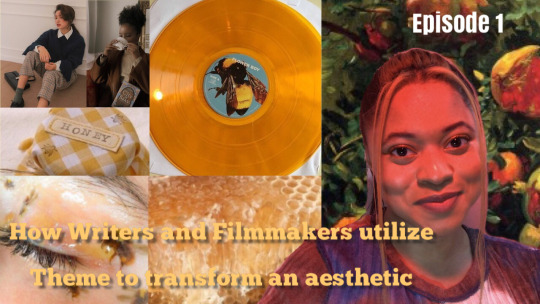
The exact science of building an aesthetic
When building an aesthetic, it is imperative to examine: the tone of your story, the feelings you want to create in your audience, and what types of settings, clothing, objects, and colors convey that.

An easy place to start with this is your story’s theme.
According to the young prophet’s guide (also known as Wikipedia): In contemporary literary studies, a theme is a central topic, subject, or message within a narrative. Themes can be divided into two categories: a work's thematic concept is what readers "think the work is about" and its thematic statement being "what the work says about the subject."
The dissection
Now let’s look at the themes and aesthetics in the internet’s current hyper-fixation: Cottage-core.


According to Aesthetics.fandom.com, Cottagecore (also known under the name Farmcore or Countrycore) is an aesthetic inspired by a romanticized interpretation of western agricultural life. It is centered on ideas around a more simple life and harmony with nature. Certain themes associated are the survival of the environment, food, and caring for people.
My favorite example, especially if we’re taking finances into account, is Ms. Honey from Matilda. Greta Gerwig’s Little Women adaptation is also a wonderful addition.
Common cottage-core themes are:
Solitude and isolation
Rejection of modern ways of living
Finding warmth and safety in femininity
The desire to escape
Romanticizing a simpler life
Connection with nature
Sometimes the idea of purity, innocence, or connecting with one’s inner child
And often times gay yearning. Gay adjacent yearning, curious yearning, forbidden yearning, forbidden yearning that turns into can’t resist yearning, and not necessarily yearning but if the opportunity presented itself… we could adjust said yearning accordingly.
While your character’s personal aesthetic does not have to be an offshoot of your story’s aesthetic—i.e. the movies and TV shows where we have the friend group with the preppy one, the sporty one, and the e-girl—each character can have their own aesthetic and exist within a larger one.
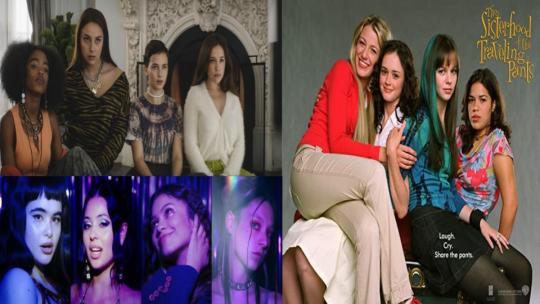
However, if your story or character doesn’t deal with say cottage core themes, it wouldn’t make sense to use this aesthetic (though of course do whatever feels right to you) unless the contrast in theme and aesthetic, heightens and transforms the narrative.
A great example of this transformation is Ari Aster’s Midsommar, a horror psychological drama with themes of deceit and betrayal. This film uses our expectation that horror lives in the dark against us by setting the most disturbing scenes in broad daylight with aesthetics that typically symbolize purity, childlike innocence, freedom, and safety.
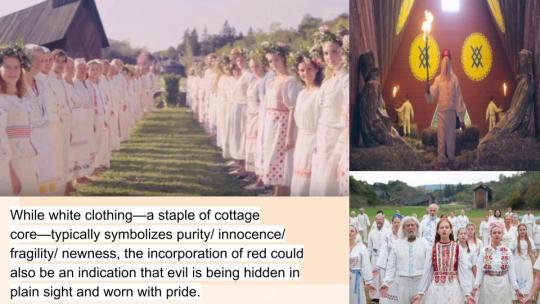
This is further exacerbated by the juxtaposition between the dreary color pallet that corresponds with Dani and Christian’s failing relationship/ the all-consuming personal tragedies in Dani’s life in the first act and the lush greens and flowers that symbolize good fortune and celebration in the following acts. This visual betrayal and contrast transforms the original aesthetic and now not only makes it unsettling, but unreliable. Thus, creating suspense. It’s brilliant and I’m jealous.
Alright guys, that was part one. Part two will be much longer and very niche and nerdy, but at this point, that’s just my brand. Happy writing!
#writing#writblr#writeblr#cottagecore#farmcore#countrycore#nanowrimo#film analysis#literature#literature analysis#academia aesthetic#aesthetic#film#creative writing#screenplay#screenwriting#book writing#novel writing
23 notes
·
View notes
Note
have you analyze any works not related to fall out boy?
i did a lot of stuff like that in school i can email to anyone who cares (mostly fitzgerald jane eyre and shakespeare were the big ones i remember doing and enjoying) and i wrote an essay about the buttertones and their 1950s imagery when they got canceled but i was definitely very deranged at that point of my life and that drama was so niche idk if itd post it or share it with anyone unless i really trusted them
the panic one is about to drop once we get our illustration and its 19 pages. i plan on a gay mcr one analyzing gerards original characters and faulker/a rose for emily/to the end
im toying with the idea of a jennifers body one but idk if ill go through with the jennifers body one because 1) idk if ill be able to back up my claims on perception of the films with enough evidence and 2) also i dont know if im at a point where im able to handle the subject matter delicately enough
5 notes
·
View notes